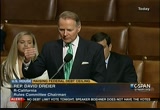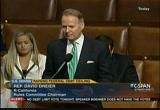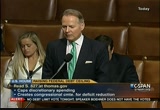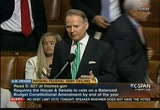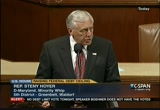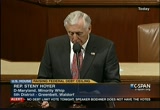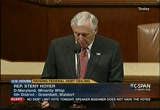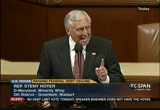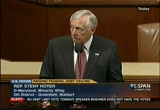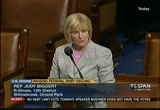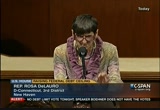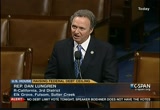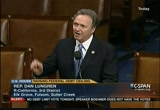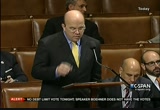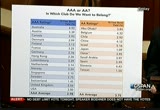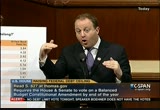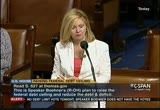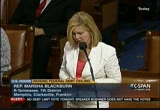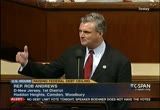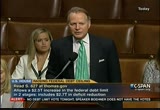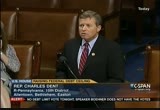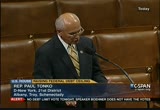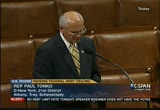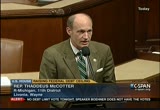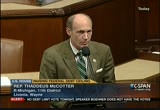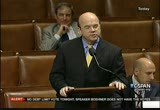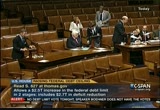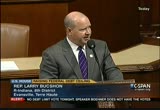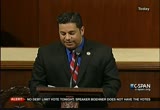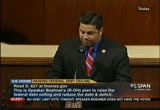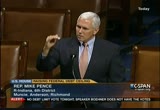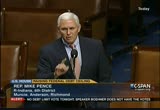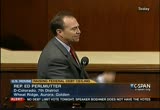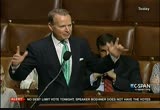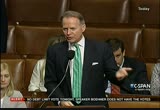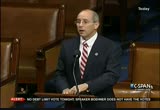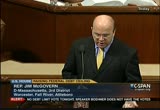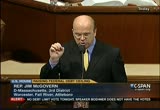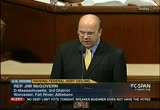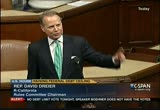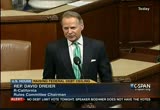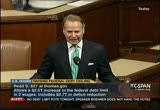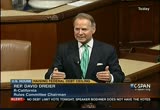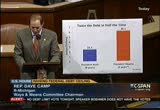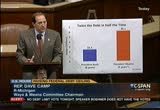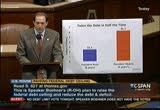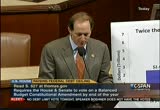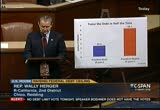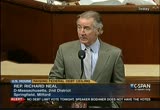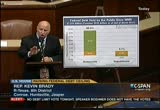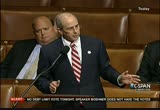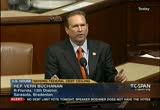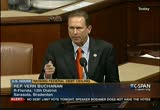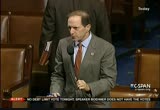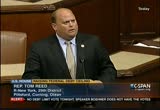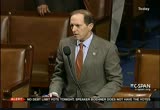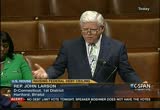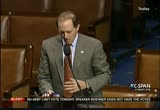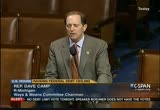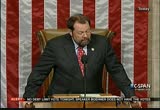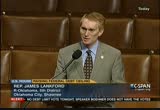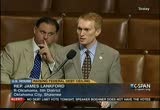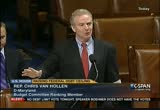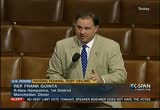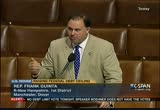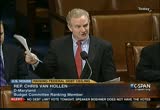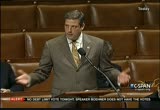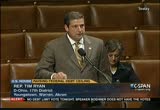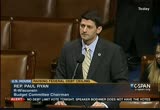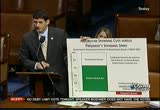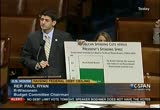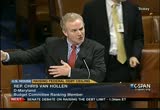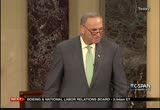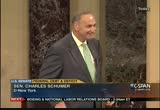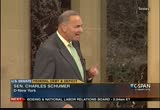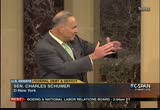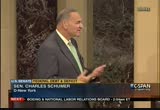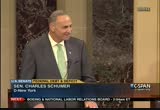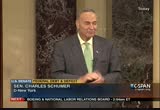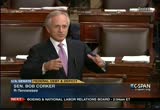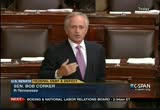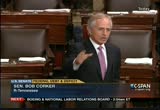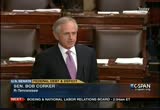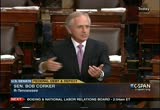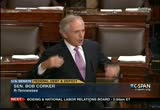tv Capital News Today CSPAN July 28, 2011 11:00pm-2:00am EDT
11:00 pm
he began working over the past several weeks and months to try to put together a bipartisan effort so that democrats and republicans alike could come together and ensure that those social security checks get out and the other obligations we have are met and that we do increase our debt ceiling. we've all followed and the american people are following very closely the global markets, -- closely, the global markets are following very closely the debates that are taking place here. it came to a head last weekend when we know the president of the united states has requested a 50% increase in the level of taxes to be increased from $800 billion to $1.2 trillion and the speaker of the house said that that was a nonstarter. so the speaker said that he wanted to work with the bipartisan leadership of the united states congress, both houses of congress. and so last weekend we know that
11:01 pm
speaker boehner and majority leader, the democratic majority leader of the united states senate, harry reid, came together and fashioned by and large the measure that is before us today. i'm the first to say that harry reid no longer supports this measure. harry reid has indicated that he does not support it. we have this letter from the 53 senators, we have word that they're going to table this measure when it passes the house of representatives. but it's important, mr. speaker, for everyone to recognize that what is before us today is by and large a measure that is not what speaker boehner would write if he were doing it on his own, it's a measure that is the byproduct of bipartisan discussion and, as the speaker likes to say, the ability to find common ground. and we are today in a position where we face in just a few days
11:02 pm
the prospect of those social security checks not going out. and, mr. speaker, that's why i don't like this measure but i'm voting for it. i'm voting for it because i want to get those social security checks out, i want to make sure the united states of america does not default and i believe that that's the responsible thing for us to do. what we have before us in the house of representatives is the closest thing, it's the closest thing to a bipartisan agreement. the measure that's over -- first of all, we know that by and large there have been no other plans put forward, but the plan that does exist, there are very few plans put forward, the plan that has been put forward by senator reid is one that does not enjoy bipartisan support and it was not put together in a bipartisan way. this one was by and large, even though it does not have the support of senator reid any longer, it was put together with
11:03 pm
-- based on the discussions they had. so i believe that this measure is deserving of strong bipartisan support here in the house of representatives and from our colleagues in the united states senate as well. so, mr. speaker, i urge my colleagues, i urge my colleagues to, in the name of sanity and in the name of ensuring that we maintain the solvency and the strength of the greatest nation the world has ever known, that we pass this measure and that we send it to our colleagues in the united states senate so they can do the same and so that when it's placed on the desk of the president of the united states he'll have his opportunity to ensure that what he predicted as a possibility for august 3, that being the social security checks will not go out, will not happen. and with that i reserve the balance of my time. the speaker pro tempore: -- the chair: the gentleman reserves the balance of his time. -- the speaker pro tempore: the gentleman reserves the balance
11:04 pm
of his time. mr. mcgovern: i would like to yield three minutes to the gentleman from maryland, the distinguished democratic whip, mr. hoyer. the speaker pro tempore: the gentleman from maryland is recognized for three minutes. mr. hoyer: i thank the gentleman for yielding. there is no common ground here. nor was it sought. we find ourselves at an unprecedented place today. americans stand on the brink of default. it stands there, my friends, because the leadership of this house has failed to act in a timely and responsible way. this is an unprecedented status for america. an intolerable place and americans are understandably outraged at the politically-caused -- politically caused impasse that confronts us. the consequences of which for every american and our country have been correctly
11:05 pm
characterized as catastrophic. for more than two centuries an american default has been unthinkable. the men and women who came before us in this chamber built up the full faith and credit of the united states until it became the bedrock of the world's economy. despite their differences they agreed that the honor that comes from paying our bills responsibly and on time was a moral obligation. now our nation is on the verge of breaking that trust. if america fails to pay its bills and default comes the wounds of the global economy, to jobs across this country, to our standing among nations, that wound will be entirely self-inflicted. it cannot and must not come to that. americans have overwhelmingly called on us to come to a
11:06 pm
balanced, bipartisan solution, one that pays our bills, reduces our deficit and draws common contributions from all americans. not only the vulnerable and the unconnected but also those who have enjoyed the nation's prosperity. that is the consequence, that is the consensus of the vast majority of the people who send us here. they understand that my way or the highway is no way to govern. they understand that all of us who had a hand in accumulating our debt must share the work of paying it off. they understand that the prosperity and prestige of our country are at stake right now. and they are relying on the ability of this body to put partisanship aside.
11:07 pm
there will in fact be bipartisan opposition to this bill. but there i predict will had be no democrat for this bill. -- but there i predict will be no democrat for this bill. i'm deeply concerned that the short-term plan of speaker boehner will put us right back, right back here on the precipice of eminent default in just a few months. casting uncertainty over the economy and leading to a job-destroying credit downgrade. each of us, ladies and gentlemen -- may i have an additional minute? mr. mcgovern: i yield the gentleman an additional one minute. mr. hoyer: each of us, ladies and gentlemen in this house, have a duty to end this impasse. let's live up to that duty by voting down this partisan legislation. and then let's come together on
11:08 pm
a balanced, bipartisan solution to reduce our deficit and pay our bills. i suggest to my friend from california that majority leader reid has offered just such a plan. in fact, it incorporates exactly what speaker boehner suggested in his speech in new york city. let us embrace that plan. when this fails, let the senate send it to us. i will not yield at this point in time. this is a moment of great crisis for our country and for our citizens. a crisis that demands our putting aside partisanship and politics for the good of our people. we're not there yet but it is my great hope that we as a body can live up to that challenge. our fellow citizens expect it, our duty demands it, our oath
11:09 pm
requires it. and i yield back the balance of my time. the speaker pro tempore: the gentleman's time has expired. the gentleman from california. mr. dreier: i say to my friend from maryland that bipartisanship has been sought and i'm seeking it right now. i hope we are in a position where we are able to enjoy bipartisan support for this and with that i yield two minutes to my very good friend from illinois, a hardworking member of the financial services committee. the speaker pro tempore: the gentlewoman from illinois is recognized for two minutes. mrs. biggert: i thank the gentleman for yielding. mr. speaker, there is not a single member of congress or the administration who do not know that this day was coming. washington was spending tax dollars more than ever before and the debt ceiling was caving in. the question is, how do we respond? do we protest? do we argue? or do we govern? last november the voters asked for change and that's how this house stopped the largest tax increase in history and cut spending this year to levels
11:10 pm
not seen since 2008. today, we have the opportunity to take the next step by passing the budget control act. this is a balanced compromise that will avert a default and stop the cycle of debt that is draining our economy. it makes nearly $1 trillion in immediate cuts, more -- lays the groundwork for additional savings and a balanced budget amendment. in a perfect world, some of us would like more cuts. those on the left also want a bigger plan. or at least a big enough debt increase to carry the president beyond the next campaign. but the american people care about jobs, not politics. they want solutions that will restore confidence, credit and growth in the united states, and neither a default nor a two-year budget gimmick will accomplish that task. this bill will. i urge my colleagues on both
11:11 pm
sides to recognize that good politics is about doing what's right for the american people. let's take this opportunity, cut spending and put america back on a sound fiscal path to prosperity. i yield back. the speaker pro tempore: the gentleman from massachusetts. mr. mcgovern: mr. speaker, at this time i'd like to yield minutes to the distinguished gentlewoman from connecticut, ms. delauro. the speaker pro tempore: the gentleman from connecticut is recognized for two minutes. ms. delauro: mr. speaker, we are five days away from a historic, unprecedented and needless default. instead of acting responsibly and in a bipartisan way to raise the debt ceiling, the republican majority continues to hold the american economy hostage to press their agenda. even though the debt ceiling was raised seven times under president bush, even though 110 current members of the majority have voted to raise the debt ceiling in the past, the majority continues its dangerous games of brinkmanship. included in this bill is $917
11:12 pm
billion in cuts, mostly to critical public investment, education, infrastructure, biomedical research, law enforcement, food safety, they will all be slashed. and yet these programs, which i call discretionary programs, they are only 3.1% higher than it was five years ago, less than what it was under ronald reagan and the first bush administration. it is disingenuous for this majority to continue these republican investments, critical to job creation and economic growth are the source of our deficit problem. the primary reason the deficits have grown is because revenues are lower than they have been in 60 years. 15% lower thanks to the bush tax breaks for the wealthy and because we initiated two wars on the nation's credit card. if the majority was serious about deficit reduction they would allow for additional revenue by asking the
11:13 pm
wealthiest americans and corporate special interests to share in the sacrifice . rather than seeking to pro-- in the sacrifice, rather than seeking to protection, which this legislation does. this bill is not about deficit reduction. it's about using the threat of default to enact a radical agenda, one that will cost jobs, undermine the american economy, where middle-class families will have an opportunity for a decent retirement. in a few months they're coming back, $1.6 trillion in cuts to medicare, social security and medicaid. this one of hostage-taking is not responsible leadership. it's the wrong direction for our country. i urge my colleagues to vote against this incredible, outrageous piece of legislation, and i call on the majority to quit playing political games. the speaker pro tempore: the gentlewoman's time has expired. the gentleman from california. mr. dreier: mr. speaker, i say to my good friend that i believe that the majority is serious and i believe that the democrats are serious in their
11:14 pm
quest to ensure we don't default. this is their opportunity to step up to the plate and make sure that it doesn't happen. with that, mr. speaker, i'm happy to yield two minutes to my good friend from gold river, the hardworking member of the committee, mr. lungren. the speaker pro tempore: the gentleman is recognized for two minutes. mr. lungren: what is incredible, what is unprecedented is the amount of debt we are incurring on a daily basis and we have been for a long time. those being hostage is the children and the grandchildren and their future. and the question we have is whether or not we are going to reach a balanced approach. what did i say a balanced approach would be? a balanced approach would be when we are once again creating jobs in this economy. what those on the other side have led us to believe is that the answer to our problems is to follow the european experience over the last 30 to 40 years. and that is to rely more on government, higher taxes with
11:15 pm
the net result of a shrinking private economy and less jobs. what is unprecedented is that we are now in the longest period of continuous unemployment that we've seen since the great depression. what is unprecedented is that if you call this a recovery, it's the most jobless recovery in the history of modern day united states. what it is is very much like what we've seen in europe over the last 30 years, and so the question before us is, do we follow the european experience with greater reliance on government, greater balance which translated means taxes when we know that not a single economist of any refute would tell us that the answer to our jobless situation is to tax those who create the jobs. that's why this is such an important vote for us today. that is, we will show that the
11:16 pm
way to the future is the american way. the way we've done it in the past, reliance on the private sector, allowing the ingenuity, the creativity, the risk-taking, the courage of the american people to bring us back to prosperity. those on the other side, the gentlelady from new york just suggested that the way to do that is through the expansion of government programs. that's not the essence of how we create jobs. we are in an unprecedented period of time. that is true, mr. speaker. we must act in an unprecedented way and that is to follow the boehner plan. the speaker pro tempore: the gentleman from massachusetts. mr. mcgovern: mr. speaker, i'd like to ask unanimous consent to insert in the record a statement by robert greenstein, the president of the center on budget and policy priorities who says that -- if enacted the boehner bill could really produce the greatest increase in poverty and hardship by any law in modern history.
11:17 pm
the speaker pro tempore: without objection. mr. mcgovern: at this point i'd like to yield two minutes to the gentleman from colorado, my colleague on the rules committee, mr. polis. the speaker pro tempore: the gentleman from colorado is recognized for two minutes. mr. polis: mr. speaker, this smoke and mirror bill before us today stands to increase, yes, increase the deficit of the united states of america by over $100 billion. let me walk the speaker through the math here. this is why credit ratings matter. countries that have a.a. credit ratings, this is a group of them, pay an average interest on their sovereign debt of 3.75%. countries with a a.a.a. rating, this is a 10-year, pay 2.89%. that's 1.75%, almost 2% difference between a.a.a. and a.a. in passing the bill today which only has a six-month extension we are jeopardizing our a.a.a. rating that will be incredibly hard to ever earn back. the addition on paying an extra
11:18 pm
two percentage points on your mortgage, two points more on your credit card debt, two points more on your car debt, in addition to that, mr. speaker, the government, the biggest borrower in the country, will pay more on the debt. in 10 years that 1.75% difference, which is just taking the average, between a.a.a. and a.a., costs over $100 billion a year in extra interest on the debt. over 10-year period, over doctor 1 trillion of additional interest paid on the federal debt. so what are we doing? cutting $915 billion and risking adding over $1 trillion in additional expenditures. this smoke and mirror effort before us today risks increasing the federal deficit at a time that we all need -- we need to decrease federal spending. we need to decrease our deficit. the last thing we need is to set motion forward to actually up our interest rate, jeopardize our credit rating because of the short-term
11:19 pm
venture and increase the interest payments on our federal debt. i encourage my colleagues to look at these numbers and vote no on the underlying bill. i yield back the balance of my time. the speaker pro tempore: the gentleman from california. mr. dreier: mr. speaker, i yield myself 15 seconds to just say to my friend that he's absolutely right. if we go into default, if we don't extend the debt ceiling we are in fact going to see an increase in interest rates. the fact of the matter is the ratings agencies like standard & poor's say that we not only have to increase interest rates but we have to put into place a deficit reduction plan that will pay down our debt and that's exactly what's happening. with that i'd like to yield two minutes to our hardworking colleague from the energy and commerce committee from brentwood, tennessee, mrs. blackburn. the speaker pro tempore: the gentlewoman from tennessee is recognized for two minutes. mrs. blackburn: thank you, mr. speaker. i rise today to offer my support for the budget control act of 2011. what i like to cut cut, cap and balance 3.0. last week the house passed cut, cap and balance 1.0 in a
11:20 pm
bipartisan fashion. not surprisingly senator reid and his democrat colleagues in the senate failed to even allow for a vote. speaker boehner then offered cut, cap and balance 2.0 which, according to the c.b.o., failed to generate sufficient savings to a company -- accompany the debt ceiling increase. so the speaker went back to the drawing board. found more cuts and reductions. i applaud him for that. once again our house will ensure the nation will take another step by enacting legislation that cuts spending more than any increase in the debt ceiling, does not raise taxes on america's families and job creators during the time of economic hardship and ensures an up or down vote on the balanced budget amendment to the constitution. and i thank my constituents and the small business owners who have called to encourage me in this process to say, let's get this job done. let it be known this is merely a small foundational step to ensure we put this nation on the road to fiscal help and it
11:21 pm
is historic by passing the budget control act, we will take away president barack obama's blank check. for the first time debt limit legislation will cut spending, lock in these cuts, cap future spending, does not raise taxes, assures that balanced budget amendment vote and keeps our attention on the nation's fiscal problems. house republicans are saying the buck stops here. let's get to work addressing our nation's fiscal woes and cutting the spending problem in washington, d.c. for that i urge my colleagues to vote yes on the budget control act. i yield back. the speaker pro tempore: the gentleman from massachusetts. mr. mcgovern: mr. speaker, i'd like to ask unanimous consent to insert in the record a recent "new york tiles" editorial entitled "the republican wreckage." >> without objection. mr. mcgovern: at this time i'd like to yield two minutes to the gentleman from new jersey, mr. andrews. the speaker pro tempore: the gentleman from new jersey is
11:22 pm
recognized for two minutes. mr. andrews: i ask unanimous consent to revise and extend. the speaker pro tempore: without objection. mr. andrews: mr. speaker, the biggest problem in this country is not that the american government is about to reach its debt ceiling. it's that too many american families have reached their debt ceiling. we have a jobs crisis in this country, and this should be our principal focus. now, somewhere in america today some decisionmakers are not getting much help with that jobs crisis. a hospital that's thinking about adding a rehab lab and adding a couple hundred jobs wonders how much medicare revenue it's going to get. this bill says, wait six months and we'll let you know. an entrepreneur who has a software company who's about to finally get off the ground is thinking about borrowing some money to hire more people, but she doesn't know what the interest rates are going to be. this bill says, wait six months and we'll let you know.
11:23 pm
and, yes, there is a diabetic, a person who is worried about whether they should keep their house or not because their health care bills are rising and they are worried medicare won't pay as many of their diabetic bills as they are now. and we're saying, wait six months, we'll let you know. we can't wait to let you solve this had problem. the republicans should listen to their own leadership. spoke out against a short-term fix to this problem. quote, we feel very strongly that one of the reasons why we continue to see an ailing economy is that people have very little confidence, very little certainty in terms of where we are headed. i completely agree with majority leader eric cantor who said that in june. we should listen to mr. cantor's advice. we should adopt a long-term plan and put america back to work, get back to the negotiating table today. i yield back the balance of my time. the speaker pro tempore: the gentleman from california. mr. dreier: mr. speaker, i at
11:24 pm
this time am happy to yield two minutes to our thoughtful and hardworking colleague, mr. dent. the speaker pro tempore: the gentleman is recognized for two minutes. mr. dent: thank you. i rise in support of the budget control act. you know, first and foremost, we, the united states house of representatives, have an obligation to govern. we have a tremendous responsibility to the american people to consider this plan that ensures our nation does not default on our nation's commitments. at the same time it places this country on a sustainable fiscal path. and let me be clear, defaulting on america's obligations to our creditors, to our seniors, disabled veterans, active military personnel, college students and many others is not an option. this bill prevents a default and it pays our bills. congress must act swiftly to deter ratings downgrade of our u.s. government. a downgrade that will affect families and small businesses all across the country. only a sound, credible plan that places on that sustainable
11:25 pm
trajectory will threaten that downgrade, driven in part by an unprecedented spending binge by this administration which has blown up the fiscal balance sheet. you know, a previous speaker said a few moments ago that we're playing games. i can assure you, this is no game. this is serious stuff. and speaking of serious, the white house is still refusing to offer a serious specific plan in writing that we can review. in fact, in a stinging review of the administration, the director of the c.b.o. said, we don't estimate speeches. you know, the senate's dug in its heels too. it would be nice if they passed the bill. any bill. it's been 800 days since there's been a budget. it's time for them to act. and to move. to prevent this type of a fiscal calamity that many have predicted. so, again, i ask my colleagues to support this legislation. it's a step forward, it may not be the final product but it moves this process forward.
11:26 pm
i encourage the senate to take it up. but most importantly, you know, we have a sacred duty and a solemn obligation to lead and to act and we do have that affirmative obligation to govern for the benefit of our country and for the american people. the world is watching. americans are watching. it's time for us to lead and demonstrate the american exceptionalism. thank you. i yield back. the speaker pro tempore: the gentleman from massachusetts. mr. mcgovern: thank you, mr. speaker. at this time i yield two minutes to the gentleman from new york, a member of the committee on budget, mr. tong -- tonko. mr. tonko: thank you, mr. speaker, and i thank the gentleman from massachusetts for yielding. we're here today at long last to vote on the republican default plan. after 200 days without a jobs agenda, after 200 days of saying that those hardest hit by the recession should bear the burden of unbalanced cuts, after 200 days of rhetoric and walking away by republican -- away, my republican colleagues have brought their default plan to the floor for a public debate and a vote. so what do they offer up? courageous leadership, a grand
11:27 pm
bargain? sad sadly, no. when you walk out of -- sadly, no. when you walk out of negotiations and spend more time talking to the press than to the president i'm not sure we expected more. we have before us the same tired policies that got us into this mess. cut taxes for millionaires, give kickbacks to special interests, pay for it all with cuts to the middle class and never forget the central tenants of the conservative agenda -- end medicare and privatize social security. my colleagues on the other side of the aisle will no doubt come to the floor to say that the bill explicitly protects medicare and social security from cuts. that claim is blatantly false. it's a desperate campaign speech to counter the backlash that comes when the american people read the bill, like they read the ryan budget. so i would ask my colleagues to take another careful look at the bill before us. it is only 57 pages long. there's even a summary online through the rules committee website and after that careful examination, i would ask you ask you to come before my -- ask you
11:28 pm
to come before my constituents and promise us with a straight face that you have no intention of using this legislation to dismantle medicare and cut social security in the next 12 months. you can't. i don't support these policies and i cannot support a plan that puts us back in the same bitter, vilifying debate in january. it may be good politics but it's not good government. i'm tired of it, my constituents are tired of it, anyone who's watched the nightly news for the last six months is tired of it. washington loves to kick the can down the road, that's how we got here in the first place. this is our moment, we need a plan, not another republican manifesto. and there are better plans out there, let us vote on them, i ask my colleagues to oppose this bill and get back to work. with that, mr. speaker, i yield back the balance of my time. the speaker pro tempore: the gentleman from california. mr. dreier: mr. speaker, at this time i'm happy to yield two minutes to our good friend and presidential candidate, the gentleman from michigan, mr. mccotter. the speaker pro tempore: the gentleman from michigan is
11:29 pm
recognized for two minutes. mr. mccotter: i thank the gentleman from california. we hear a lot of talk about plans, we hear a lot of talk about secret default plans, senate plans, the reid plan. but we've yet to hear about the president's plan. we live in a period of time where we are engaged in a struggle against economic stagnation. where 30 million people can't trade jobs because there are no better ones out there. where 14 million people are unemployed. this is a period of time where inflation is rising, real wages are declining. in short we live in a period of time in which we are being neither led nor governed. we are seeing postures, not plans. with one exception -- the house republicans have endeavored to
11:30 pm
meet the duty that was entrusted to them by the american people which is to put forward a plan that will prevent the default of the united states and a diminishment of our economic credibility in the world. unfortunately what we get in response is not an attempt at honest, bipartisan collaboration . instead it is more political rhetoric, more partisanship, more posturing. at this point in time we have before us a plan that can work. it is not a perfect plan, people on both sides of the aisle have their qualms with it and yet it is a plan that can be helpful to the american people, that can be helpful to ensuring that our economy does not further deteriorate, a plan that can
11:31 pm
make sure that big government no longer crushes the aspirations of the american people to grow this economy, to find employment, to secure their pursuit of happiness around the harget of home. -- harth of home and for that i will support this bill and i would urge my colleagues to do it because the american people deserve no less. i yield back. the speaker pro tempore: the gentleman from massachusetts. mr. mcgovern: thank you, mr. speaker. i'd like to yield one minute to the gentlewoman from california, ms. chu. the speaker pro tempore: the gentlewoman from california is recognized for one minute. ms. chu: what's not safe under the boehner default plan? social security, medicaid and medicare are not safe under the boehner default plan. in just seven months it forces nearly 1.6 -- $1.6 trillion in cuts from these programs, they will be unrecognizable. jobs are not safe under the boehner default plan. it will force two million americans to lose their jobs, putting greater strain on struggling families.
11:32 pm
our economy is not safe under the boehner default plan. this short-term deal could lead to an automatic tax increase for every american with a mortgage, car loan or credit card. it would leave a cloud of uncertainty. businesses won't invest and our economy won't groge grow. nothing is safe under the -- won't grow. nothing is safe under the boehner default plan except tax breaks for big oil companies that ship jobs overseas and the rich. we must reject this ideological approach and come together on a balanced solution that will ensure that every american will have a safe and secure future. the speaker pro tempore: the gentleman from california. mr. dreier: mr. speaker, may i inquire of the chair how much time is remaining on each side? the speaker pro tempore: the gentleman from california has 12 1/4 minutes remaining. the gentleman from massachusetts has 17 minutes remaining. mr. dreier: i reserve the balance of my time. the speaker pro tempore: the gentleman reserves the balance of his time. the gentleman from massachusetts. mr. mcgovern: i yield 1 1/2 minutes to the gentleman from
11:33 pm
virginia, mr. moran. the speaker pro tempore: the gentleman from virginia is recognized for 1 1/2 minutes. mr. moran: mr. speaker, according to grover norquist who is apparently the real republican strategist, this is about ensuring that democrats will never again have the revenue to govern as democrats. but what does he mean by that? is he talking about when roosevelt rescued us from the great depression? in the 1930's? or when we saved the world for democracy in the 1940's? or when we built the middle class with the g.i. bill in the late 1940's? or when we won the race to space in the early 1960's? or when we started medicare and passed civil rights laws in the mid 1960's? or when president clinton raised taxes, balanced the budget, generated $20 million -- 20 million new jobs, cut poverty, grew the middle class, passed on projected surpluses as far as the eye could see and enabled those at the top tax rates to
11:34 pm
take home more after tax income than in any prior time in american history? the fact is that democrats have made this nation great by investing in all our people and by raising the revenue necessary to meet our obligations and to secure our future. this is the alternative, this is about an ideology that lowers our sights, diminishes our statue and sells short our future. that's why it should be rejected, mr. speaker. the speaker pro tempore: the gentleman from california. mr. dreier: mr. speaker, in light of the disparity here, i'd like to continue to reserve the balance of my time. the speaker pro tempore: the gentleman reserves. the gentleman from massachusetts. mr. mcgovern: i'd yield one minute to the gentleman from massachusetts, mr. lynch. the speaker pro tempore: the gentleman from massachusetts is recognized for one minute. mr. lynch: thank you, mr. speaker. i rise today in opposition to the budget control act because i honestly believe that this nation is better than this bill reflects. scruft so we're clear on the
11:35 pm
difference here between -- just so we're clear on the differences here between our positions, this amendment seeks to place the overwhelming burden of this crisis on the backs of senior citizens and it forces seniors especially to make enormous sacrifices while at the same time it allows the richest americans and oil companies and hedge fund operators to escape any responsibility or sacrifice. this is not how we should be treating america's greatest generation who survived the great depression, who fought in world war ii and who made the sacrifices in their time when their country called upon them. this is not the way to treat the frail elderly or any senior who at the end of their working lives are now on a fixed income. the way we deal with this crisis will say a lot about america. i think hubert humphrey said it best he said that the true test of any society is how we treat those citizens in the dawn of life, our children, those in the twilight of life, our elderly, and those in the shadow of their lives, our poor and disabled at
11:36 pm
the end of their lives. mr. mcgovern: i yield the gentleman an additional 30 seconds. mr. lynch: thank you. i just want to say, as republicans are rallying to the ramparts to save the millionaires from suffering from any loss of a tax loophole, i take full measure of pride at where the democrats in this house are standing on this issue. i urge my colleagues to stand with seniors and vote no on this amendment. thank you, i yield back. the speaker pro tempore: the gentleman from california. mr. dreier: mr. speaker, i mentioned last november, sent 87 new republicans to the house of representatives, one of them is the very thoughtful gentleman from indiana, mr. buechon. at this time i'd like to recognize him for two minutes. the speaker pro tempore: the gentleman from indiana is recognized for two minutes. mr. buchanan: mr. speaker, i rise today -- burebbureb mr. speaker, i rise today for america's financial future. we're at a time when we need to make every effort to save our nation's credit rating. the rating agencies have said that raising the debt ceiling is not enough.
11:37 pm
while i prefer the cut, cap and balance plan, the budget control act vote today and the balanced budget amendment vote tomorrow is the best remaining approach to reduce spending and help avoid a downgrade. mr. bucshon: we can reform today. however, the bill isn't perfect. i wanted more and frankly all of our constituents deserve more. the reality is our friends on the other side of the aisle won't allow it. with years of reckless spending by the federal government instead of making tough choices to address our spending problems , the other side wants to raise taxes on the american people, to finance funding washington, d.c.,'s spending spree. in addition they want us to give the president a blank check to get him through the 2012 election. well, that's not going to happen. the united states has always maintained a a.a.a. credit rating and the threat of inaction by our colleagues in
11:38 pm
the u.s. senate and no plan offered by the administration puts that at risk. the house has and will take action. we need to send a clear message to the american people that we are willing to make the tough choices and work together on behalf of our nation's citizens. i urge all my colleagues on both sides of the aisle to support this bill and take the first step to restoring fiscal responsibility to our nation. with that i yield back. the speaker pro tempore: the gentleman from massachusetts. mr. mcgovern: mr. speaker, i would like to yield two minutes to the gentleman from kentucky, a member of the budget committee, mr. yarmuth. the speaker pro tempore: the gentleman from kentucky is recognized for two minutes. mr. yarmuth: i thank my colleague. mr. speaker, congress' approval rating is up in down around 10% and given the debate on this politically induced default crisis, i have to ask myself, who are these crazy 10%? the american people are looking at this institution right now and they're asking, what on earth are you thinking? they're sick of these games and they're sick of us. they want this default crisis reduced, resolved now, they
11:39 pm
definitely don't want to repeat it six months from now and they understand that a real solution means a real compromise. our constituents have made it clear they want shared sacrifice where millionaires, billionaires and oil companies contribute their fair share. they want their social security and medicare benefits to be protected, but this bill, the republican default agenda, does none of that. in fact, this reckless bill is actually a stealth attack on medicare and social security because it requires large cuts next year that can only cut -- come from those programs. the boehner plan would increase borrowing across local and state government and citizens, producing essentially a back door tax hike on the american people. it does damage to seniors and the we are going to run our
11:40 pm
country in the ground, failing to respond to the crisis. the american people are demanding better. we need to defeat this bill so we can move on to a real solution. i yield back. the speaker pro tempore: the gentleman from california. mr. dreier: mr. speaker, at this juncture i think i'll reserve the balance of my time. the speaker pro tempore: the gentleman from massachusetts. mr. mcgovern: mr. speaker, i yield one minute to the gentlewoman from ohio, ms. sutton. the speaker pro tempore: the gentlewoman from ohio is recognized for one minute. ms. sutton: i'm frustrated as we sit on the drink of the financial unknown people in my district are left hanging, worrying about jobs. and the bill before us fails to address the number one priority of creating jobs. instead, it puts us in the exact same position six months from now. it protects tax cuts for millionaires and big corpgs that ship jobs overseas. it's been 200 days of this new republican-led congress and
11:41 pm
what sh we seen? we've seen targets at medicare and working families, the environment and education. we have even seen them use up time to target energy-efficient light bulbs. but what we have not seen them do is target job creation. i encourage my colleagues to vote no on this risky plan and responsibly raise our debt limit so america can pay its bills and this congress can get serious about creating good-paying jobs. and i yield back. the speaker pro tempore: the gentleman from california. mr. dreier: can i inquire how much time is remaining? the speaker pro tempore: the gentleman from california has 10 3/4 minutes remaining and the gentleman from massachusetts has 11 1/2 minutes remaining. mr. dreier: i reserve the balance of my time. the speaker pro tempore: the gentleman reserves the balance of his time. the gentleman from massachusetts. mr. mcgovern: mr. speaker, at this time i'd like to yield one minute to the gentleman from new mexico, mr. lujan, for one minute. the speaker pro tempore: the gentleman from new mexico is recognized for one minute. mr. lujan: thank you, mr. speaker. it's very clear that we have to act to prevent a default and a downgrade of our nation's
11:42 pm
credit rating. sadly, the house republican leadership's plan is not a serious plan to avoid such a downgrade. more smoke and mirrors. we heard that talked about lately. it will put us right back in the same position in a few months, requiring another vote to raise the debt limit, putting america in further area where we might be able to see the potential downgrade, costing americans $100 billion a year, $1 trillion over 10 years. a short-term increase in the debt limit has already been rejected by economists and credit rating agencies which made it clear that this plan will likely result in an unprecedented downgrade to our credit rating, leading to higher interest rates for mortgages, student loans, for all americans in addition, this reckless plan leaves the door the open -- mr. dreier: will the gentleman yield for just one second, mr. speaker? i want the gentleman to cite -- mr. lujan: mr. speaker -- mr. dreier: i'm sorry. i thought he yielded.
11:43 pm
mr. lujan: i don't believe i did yield. the speaker pro tempore: the gentleman from new mexico controls the time. mr. lujan: how much time is left -- mr. dreier: mr. speaker, i'd like to yield the gentleman 15 seconds. the speaker pro tempore: the gentleman is recognized for 25 seconds. mr. lujan: it leaves the door open to the same damage as the ryan's plan to attack medicare, medicaid and social security while protecting tax breaks for billionaires and corporations. mr. speaker, it's important that we talk to the american people about this and that we have this conversation. i urge my colleagues to reject the partisan gamesmanship and seek a responsible and balanced solution to this crisis and with that, mr. speaker, i think there's a little bit of time left and yield it back to the minority. the speaker pro tempore: the gentleman from california. mr. dreier: mr. speaker, i'd like to engage in a discussion with my friend just to ask exactly -- i'm sorry -- did the gentleman not yield to me. i'm confused. the speaker pro tempore: the gentleman from california. the gentleman from california
11:44 pm
controls the time. mr. dreier: ok, thank you very much, mr. speaker. well, at this time i'm happy to yield to the next governor of indiana, the gentleman from columbus, mr. pence. the speaker pro tempore: the gentleman from indiana is recognized for two minutes. mr. pence: thank you, mr. speaker. i thank the gentleman for yielding. i'd like unanimous consent to revise and extend my remarks. the speaker pro tempore: without objection. mr. pence: mr. speaker, i come to the floor to rise in support of the budget control act of 2011. which is a negotiated compromise between the speaker of the united states house of representatives and the republican and democratic leadership of the united states senate. let me say that again. the budget control act that we will bring to the floor today is a compromise. at a time when people across america long for washington, d.c., that is able to reach across the aisle, lower the
11:45 pm
volume, solve the problem, this legislation comes to the floor. and i'm proud to support it. and the truth is it's a difficult time for people across my beloved indiana and all across this country. our economy's struggling. unemployment's at 8.3% in indiana and 9.3% nationally. and i believe that runaway federal spending by both political parties is a cause and a barrier to our economic recovery today. we simply must put our fiscal house in order. now, i know the administration wanted to simply raise the debt ceiling without conditions, but that was rejected. i think almost unanimously in the united states senate. and we rejected it as well in this body. what needs to be done today is we need to recognize that if you owe debts, pay debts.
11:46 pm
we have to raise the nation's debt ceiling so we have the money to pay the nation's bills, but we also owe a debt to this generation of americans struggling in this economy and to the next generation of americans that we can only repay through fiscal discipline and reform. and the budget control act does that. the budget control act does two things that i believe are worth highlighting. number one, it ensures in this first installment that there will be a dollar in budget cuts for every $1 in increase and borrowing authority by the united states, and that's crucial. mr. dreier: mr. speaker, i'd like to yield my friend an additional minute. mr. pence: secondly, the agreement around the budget control act also ensures that there will be a vote in this body, now tomorrow, and a vote in the united states senate this fall on a balanced budget amendment to the constitution
11:47 pm
of the united states. there are other aspects of this bill that are meritorious. a hard spending caps, more enforceable than spending cap of the past. the creation of a bipartisan commission to negotiate spending discipline and reforms for the next installment of a debt ceiling increase. but for my part, making sure that any increase in the debt ceiling is matched, dollar for dollar, with spending caps in this bill and for the first time in 15 years bringing a bipartisan version of the balanced budget amendment to this floor of the house and soon to the floor of the senate. a worthy note. and they should endorse this approach. this is a very serious time, mr. speaker, and i welcome the budget control act as evidence that congress can still compromise. we can still come together across the aisle. we can find a way to pay the nation's bills and do so in a
11:48 pm
way that reflect our commitment to fiscal discipline and reform. the speaker pro tempore: the gentleman from massachusetts. mr. mcgovern: thank you, mr. speaker. at this time i'd like to yield one minute to the gentleman from colorado, a former member of the rules committee, and we miss him, mr. perlmutter. the speaker pro tempore: the gentleman from colorado is recognized for one minute. mr. perlmutter: i thank the gentleman from massachusetts. and mr. speaker, i think we got to go back 10 years and talk about where we were at that time. under bill clinton this country had a surplus. revenues exceeded expenses. things were going along great. we were adding jobs by the millions. we have a republican administration. two tax cuts. couple trillion dollars lower revenue. two wars. couple trillion dollars more expense. a crash on wall street. $3 trillion in expense to this country. that's where this expense comes from. that's why we have bills to pay. we had a tough 10 years. most of it under republican administration. we got to pay those bills, but
11:49 pm
the republican leadership has brought us to the brink of default. something the united states has had full faith in credit for 235 years and they want to bring that right to the brink of default. ladies and gentlemen, we are better than that. we have a responsibility. we can't live in turmoil. we need to rebuild the american dream for people who want to -- a shot at getting ahead in life, not a brinksmanship. this is a bad bill and must be defeated and with that i yield back. the speaker pro tempore: the gentleman from california. mr. dreier: mr. speaker, i reserve the balance of my time. the speaker pro tempore: the gentleman reserves the balance of his time. the gentleman from massachusetts. mr. mcgovern: yes, mr. speaker, at this time i'd like to yield one minute to the distinguished gentleman from georgia who serves on the financial smbs committee, mr. scott. the speaker pro tempore: the gentleman from georgia is recognized for one minute. mr. scott: thank you very much. america, we really need to pay close attention here. first of all, this is a terrible bill at the wrong time. here we are, the number one
11:50 pm
issue facing the american people is jobs, and this bill is a major job killer of the highest magnitude. it will average a loss of 4,000 -- 40,000 public service jobs in the public sector each month. all we have to do is look at the record from the month of june, and the month of june the private sector created 58,000 jobs, but because of massive cuts in the public sector there was a loss of 40,000 jobs each month. in addition to that, this bill will drastically end medicare. it will reduce medicaid payments to the states, and it will severely cut back the checks to our social security recipients. by an average of $1,000 each month. now, ladies and gentlemen -- mr. dreier: i'm happy to yield
11:51 pm
my friend additional time. the speaker pro tempore: the gentleman from california. mr. dreier: mr. speaker, i'd like to yield my friend additional time, if i might. may i yield my friend additional 30 second, and will the gentleman yield to me? mr. scott: well, since you yield 30 seconds which you've already taken my last 30 seconds. mr. dreier: well, i'll yield additional time if i need it. where in this bill can he point to where cuts in medicare are going to take place? and i thank my friend for yielding. i've gone through it. mr. scott: you know perfectly well, mr. dreier, that the announced cuts in this bill and the setting up with this commission and also your party has already set a record on a roll -- the speaker pro tempore: the gentleman from georgia controls the time. mr. scott: let me go back and i want to answer your question, but it's very important, mr. speaker, that we also understand that the other
11:52 pm
dangerous part about this bill is that in six months we will be right back here again which will add greater instability to the markets and further undermine our credibility rating. mr. dreier: mr. speaker, i yield myself 15 seconds simply to say to my friend there are exemptions in this bill to ensure that social security and medicare are not touched, and we need to remember that. when it comes to this sequestration process that it's not touched. and for those who are saying that this measure will in fact bring about the cuts have not read the bill and are mischaracterizing it. mr. scott: there is nothing in this bill that exempts -- the speaker pro tempore: the gentleman's time has expired. the gentleman from massachusetts. mr. mcgovern: mr. speaker, i want to yield 30 seconds to the gentleman from new jersey. mr. andrews: i want to ask the gentleman from california a question. i'd yield. is the gentleman saying the text says if the commission set up reports back a cut in social security benefits that that may not be enacted by the
11:53 pm
commission? i yield. mr. dreier: will the gentleman yield? mr. andrews: i do. mr. dreier: i thank my friend for yielding. and let me say the sequestrations in this bill -- mr. andrews: reclaiming my time. reclaiming my time. mr. dreier: my friend said that this measure -- mr. andrews: reclaiming my time, mr. speaker. the speaker pro tempore: the house is not in order. mr. andrews: mr. speaker, reclaiming my time. the speaker pro tempore: the gentleman from new jersey's time has expired. the gentleman from new jersey's time has expired. mr. mcgovern: i yield the gentleman 30 seconds. the speaker pro tempore: the gentleman is recognized for 30 seconds. mr. andrews: mr. speaker, i'm not talking about the sequestrations. i'm talking about the fact that this commission's instructed to find $is.8 trillion in cuts, and -- 1.8 trillion in cuts, and medicare and social security are not exempted from those cuts. mr. dreier: will the gentleman yield? mr. andrews: this is a road map, a user's guide as to how to cut social security and medicare. we reject it. i yield to my friend. mr. dreier: i thank my friend for yielding. let me say, this is not a commission. members should not refer to
11:54 pm
this as a commission because the idea of a commission, some sort of outside entity, we're talking about our colleagues in the house and senate who will be members of the joint select committee -- the speaker pro tempore: the gentleman's time has expired. mr. dreier: i thank my friend for yielding. the speaker pro tempore: the gentleman from new jersey's time has expired. mr. mcgovern: i yield 10 seconds. mr. andrews: the gentleman is correct, it's not a commission. it's a committee that is empowered to cut medicare and social security. we will not stand for it. mr. dreier: mr. speaker, may i yield myself 10 seconds to say to my friend, this is not a committee that's empowered to cut social security and medicare. it is a committee, a joint select committee that is empowered for the first time to submit to both houses of congress a recommendation that we will have an up or down vote on. with that i reserve the balance of my time. the speaker pro tempore: who yields time? the gentleman from massachusetts. mr. mcgovern: i'd yield two minutes to the gentlewoman from
11:55 pm
maryland, ms. edwards. the speaker pro tempore: the gentlelady from maryland. ms. edwards: thank you, mr. speaker. i rise in opposition to the underlying bill. this is nothing more than will bill and amended. so many as in favor say aye. those opposed, no. the rules are suspended and the bill is passed and without objection, the the motion to reconsider is laid on the table. for what purpose does the
11:56 pm
gentleman from texas rise? mr. sessions: i send to the desk a privileged report from the committee on rules for filing under the rule. the speaker pro tempore: the clerk will report the title. the clerk: resolution waveg the requirement of 6-a of rule 13 reported from the committee on rules. the speaker pro tempore: referred to the house calendar and ordered printed. for what purpose does the gentleman from texas rise. mr. sessions: i move the house do now adjourn
11:57 pm
>> the house is coming back in at 9:00 eastern tomorrow. we will have live coverage on c- span. coming back to hear more debate on the bill from earlier today. with that i'm happy to yield a minute to my very good friend from lafayette, louisiana, a hardworking member of the ways and means committee, mr. boustany. the speaker pro tempore: the gentleman from louisiana. mr. boustany: thank you, mr. speaker. i think it was a gross distortion of what's being proposed here and again she -- the previous speaker just condemned the majority leader's, harry reid, the senate majority leader's bill in the senate. that's the only democratic bill we've had. so i think it seems to me there's a little bit of a fight going on over on the other side
11:58 pm
of the aisle between their house members and senate. to my friend from new jersey, this committee that's formed is a committee of active sitting members of the house and senate. so in order for anything to be recommended by this committee, it would require in all likelihood all of the democrats to support it. mr. andrews: would the gentleman yield? mr. boustany: i yield. mr. andrews: if they wanted to close tax loopholes would they need a simple majority? mr. boustany: it would be a simple majority. a simple majority. mr. andrews: it's your position that a simple majority of both houses could raise taxes? mr. boustany: that's correct. that's what we need. we need that to force some movement -- the speaker pro tempore: the gentleman's time has expired. mr. boustany: thank you, mr. speaker. the speaker pro tempore: the gentleman from massachusetts. mr. mcgovern: mr. speaker, at this time it's my privilege to yield two minutes to the gentleman from south carolina, the distinguished assistant leader, mr. clyburn.
11:59 pm
the speaker pro tempore: the gentleman from south carolina for two minutes. mr. clyburn: i thank my friend for yielding to me. mr. speaker, father clock is ticking, the republican majority is dickering and the american people are hurting. our financial markets are on pace for their worst week in nearly a year. state governments are bracing for downgrades in their borrowing capacities and the gap between those in our society who have a lot and those who have very little is growing. the republican majority continues their efforts to divert attention from the self-inflicted crisis with manufactured controversies, holding the american economy hostage to their reckless and dispassionate demands. as the clock ticks toward default and the pain it would bring to middle income families and those who aspire to become middle income, my friends on the other side continue to play politics.
12:00 am
speaker boehner does not even pretend that this is a serious attempt to solve the problem. he sold this bill to his conference by telling them that it wasn't bipartisan and with divided government, a plan that isn't bipartisan is no plan at all. it's just a game. the president and the democrats in congress, as well as the american people, have advocated a balanced approach to reduce the deficit while growing the economy and protecting the most vulnerable, including medicare, medicaid and social security beneficiaries. and we have been willing to make tough, politically difficult compromises. this bill on the floor today, just like the bill from last week, is yet another partisan time waster. our constituents are not interested in any of us voting to cut medicare or cap social
12:01 am
security or balancing the budget on the backs of medicaid recipients. a six-month extension is another waste of time. we must resolve this better now and ensure the full faith and credit of the united states. let's defeat the boehner bill. the speaker pro tempore: the gentleman's time has expired. the gentleman from california. mr. dreier: mr. speaker, i'd like to inquire of my friend how many speakers he has remaining. mr. mcgovern: i'm the final speaker. mr. dreier: i'd encourage my friend to proceed and then i'll offer -- mr. mcgovern: are you the final speaker? mr. dreier: yeah. mr. mcgovern: how much time left, mr. speaker? the speaker pro tempore: 3 1/4 for you. mr. mcgovern: mr. speaker, i'd like to ask unanimous con sent to insert into the -- consent to insert into the record an article about republican leaders vote for debt drivers they blame on obama.
12:02 am
the speaker pro tempore: without objection. mr. mcgovern: mr. speaker, this bill does nothing to solve our long-term fiscal challenges because everybody here knows that this is isn't going anywhere. instead it's -- that this isn't going anywhere. instead it's a political stunt. instead it hurdles us closer and closer to a devastating default. for years presidents and congresses of both parties have raised the debt ceiling, recognizing that endangering the full faith and credit of the united states would be a grave mistake. it's amazing to me how many republicans i've heard who dismiss the potential of default as no big deal. no big deal? tell that to the family who would have to pay higher interest rates on their mortgage, their car loan, their student loan. it would be a very big deal to them. many of my friends on the other side of the aisle didn't just stand by as we created these massive deficits. they were active participants. they voted for two huge tax cuts, mostly for wealthy people, that weren't paid for. two wars that weren't paid for.
12:03 am
a massive prescription drug program that wasn't paid for. and now their solution is to punish the very americans who can least afford it, all in the name of keeping their rich friends and their special interests happy. the boehner plan is unbalanced and unfair. it slashes programs like social security and medicare that benefit the middle class and the poor. but the republicans insist on protecting tax breaks for oil and gas companies, just today exxon mobil announced profits of $10.7 billion for the second quarter. do they really need special tax breaks? the american people sure don't think so. poll after poll shows that the vast majority of our citizens prefer a balanced approach. yes, we need to cut spending. yes, we need to reform our government. but everybody needs to chip in, to do their part, including the very wealthy who have benefited the most.
12:04 am
now, there are certainly places to save. how about ending wars that aren't paid for? right now we borrow $10 billion every month for military operations in afghanistan alone to prop up a corrupt and incompetent karzai government. how about ending wasteful subsidies to big agriculture companies? how about asking billionaire hedge fund managers to pay the same tax rates as their secretaries? the truth is that the best way to deal with our long-term fiscal situation is to grow our economy. that means creating jobs and putting people back to work. the last election i thought was about jobs. we haven't talked about jobs at all since the new republican majority became -- came to power. that means investing in things like education and infrastructure and green technology and medical research. that's the kind of economic future the american people deserve. the boehner default plan would take us exactly in the wrong direction and urge my colleagues on both sides of the aisle to
12:05 am
reject it. i yield back the balance of my time. the speaker pro tempore: the gentleman yields back the balance of his time. the gentleman from california has 5 1/2 minutes remaining. the gentleman is recognized. mr. dreier: mr. speaker, as i listen to my friend from the other side of the aisle, mr. mcgovern, talk about what has caused the problem that we're in right now, he failed to mention the failed stimulus bill, he failed to mention the failed health care bill, both horribly expensive. but i think it's important for us to look at the facts on one of the items that he mentioned. they continue, mr. speaker, to engage in this class warfare, us versus them, the multibillionaires, the -- all this sort of stuff, over and over and over again. we happen to recognize that we're all in this together and there should be shared sacrifice. i think that's why it's important for us to look at the facts. let's look at the facts here. as we continue to hear people decry the so-called bush tax cuts, which as we all know are no longer bush tax cuts, they are the bush-obama tax cuts, they became that last december
12:06 am
when president obama supported the extension of them, let's look at what happened with the 2003 growth-oriented tax cuts. in 2003, mr. speaker, the federal government had $1,782 ,000,000 in revenues. that was in 2003 before the growth-oriented tax cuts went into effect. mr. speaker, in 2007 the federal government had a 44% increase in the flow of revenues to the federal treasury by virtue of those 2003 tax cuts. they went from $1,782 ,000,000,000 to $2,567,000,000,000. that's a $785 billion increase in the flow of revenues to the federal treasury after the now bush-obama tax cuts were put into place.
12:07 am
so this mularkey about the notion of those who are successful are not paying their fair share of taxes is absolutely preposterous. i want to take the time that i have remaining to shatter a few myths that are out there. first of all, we know right now that we're facing a crisis. both democrat and republican alike in these remarks have made it clear that we're facing a crisis. i have yet to hear anyone, i think maybe the minority whip mentioned the reid plan, all anyone's done on the other side of the aisle is malign the boehner plan. and mischaracterize it, quite frankly, mr. speaker. but i think it's important to look at what it is that we face. we know that the president of the united states said that if we don't increase the debt ceiling by august 2, on august 3 he does not know whether or not the social security checks will actually go out. well, mr. speaker, we all want to make sure that the social security checks go out. this is going to be our one opportunity to vote for a measure that will ensure that we increase the debt ceiling, so
12:08 am
that those checks will go out, and for the first time in the 75 times that the debt ceiling has been increased since 1962 we're going to get to the root cause of the problem. in the past four years we've had an 82% increase, an 82% increase in nondefense discretionary spending. and guess what? the american people last november said, that has to come to an end. and you know what? it's going to come to an end when we pass this measure. i also want to say that we know that the threat of default is out there and if we don't take actions we know that our credit rating will be downgraded. we know that that will happen. all of the rating agencies have predicted that. they've also said that simply increasing the debt ceiling is not adequate, we need to make sure that we get ourselves on a path that reduces the debt and reduces our deficits. well, mr. speaker, what we need to do is we need to recognize
12:09 am
also that those agencies have said, these proposals are that path. there was a report that s&p 500 had said that we in fact, if we didn't have $4 trillion in cuts which i frankly wish we could, but in light of the fact that this is a bipartisan effort we're not going to get that high, but they said that if we didn't have $4 trillion in reductions that we would still threaten the credit rating. well, yesterday, the president of standard & poor's testified before the financial services committee and said, well, we must get on a path toward reducing the deficit and debt, it was inaccurate. it was inaccurate to say that it had to be a $4 trillion level and that's why, as my friends have been quoting these different sources i was trying to get them on record to say who in fact is saying this. . we have to increase the debt ceiling and get ourselves on a path that will reduce the annual deficits and the gnat debt.
12:10 am
the plan before us is far from perfect. speaker boehner doesn't like it, i don't like it, but the rest of us recognize that we have a democratic president and a democratic united states senate. if we are going to increase the debt and are going for the first time, first time ever ever change the course on the issue of debt ceiling increases by cutting spending, we have to pass this measure. it grew from this bipartisan compromise last weekend. harry reid no longer supports it. i haven't heard anyone on the other side say they supported it, but it was a bipartisan compromise. let's support this measure, mr. speaker. and with that, i yield back. the speaker pro tempore: the gentleman's time has expired. now in order under the rule to have 30 minutes of debate controlled by the committee on ways and means. 15 minutes will be controlled by the chairman of the committee, mr. camp of michigan and 15 minutes controlled by mr. levin
12:11 am
from michigan. the chair recognizes the gentleman from michigan, mr. camp. mr. camp: i yield myself such time as i may consume. the chair: the gentleman is recognized. i mr. camp: i support the act which cuts out-of-control spending and responsible and necessary plan to avoid a default on our nation's debt. as we know under president obama, we are experiencing our third straight year of deficits in excess of $1 trillion. in four years, president obama's actions and projected budgets will add more than twice to our debt than was added during the previous eight years. all told, the debt will double under president obama's watch and reach a staggering $26 billion by 2021.
12:12 am
double the debt in half the time when compared with the previous administration. congress must act to cut spending and get our debt under control and that's what the legislation before us does. first, the bill cuts more than $900 billion in federal spending and meets the expectations of the american people that we cut spending more than we increase the debt limit. second, the bill guarantees the house and senate will vote on a balanced budget amendment. more than half of the states have a balanced budget requirement and it's time washington's books are balanced as well. third, the bill demands reforms to the way washington works by setting up a joint house and senate committee to find at least $1.6 trillion in additional savings. its work product would enjoy expedited consideration in the house and senate and could not be filibustered. despite what you have heard from the critics of this approach, that this is the most common way the debt limit has increased for
12:13 am
a short duration and tied to spending reforms and history is pretty clear on this point. over the last 25 years, congress and the president have acted 31 times to increase the debt limit. 22 of those 31 times were for less than a year. only three of those, 31 increases lasted longer than two years. these debt limit increases are tied to spending reforms and preceded by short-term increases. three examples, 1987, three short-term debt limit increases prior to a longer term increase that included deficit targets and automatic sequestration provisions. 18990, there were six short-term increases before long-term increases. and in 1996, there were two very short-term increases to ensure full funding of social security and other federal funds before a longer term increase included in
12:14 am
the contract of america advancement act. what we are doing today is what has happened before. i would also point out that the increase in the debt limit and the binding process to achieve spending reform in washington is exactly what the financial markets need and expect from us. time is short and this bill may be our last, best chance to prevent a default. if we fail to act and the government defaults on its debt, the financial and economic shock waves that will ripple across this country are unpredictable and unimaginable. i want to say a few words about what is not in this bill and that is tax increases. while the president insists that tax increases be part of any debt limit, he failed to convince his own party. in december of last year when democrats controlled both the house and the senate, congress refused to raise taxes and now even senator reid's own plan to increase the debt limit which
12:15 am
the president has thrown his support behind, does not include tax increases. given the need to get our fiscal house in order for the future, we must pass the budget control act and i urge a yes vote on this bill and i reserve. the chair: the gentleman reserves the balance of his time. the gentleman from michigan, mr. levin, is recognized. mr. levin: i yield myself such time as i may consume. the chair: the gentleman is recognized. mr. levin: as i have been listening to this debate, i think it's critical that the house needs some truth in speaking. this bill is not bipartisan. the vote will soon show that. this bill is not a compromise. it is not a compromise. it does not seek bipartisan
12:16 am
common ground. indeed, it is orchestrated onlt to find enough common ground among house republican partisans. this bill does not reflect compromise. it would compromise indeed medicare and social security. it forces massive cuts consistent with the ideological republican budget that was unanimously opposed by democrats. this bill does not promote certainty for our nation's economy. instead, it brings more un certainty for families facing major financial decisions, for businesses deciding whether to invest or hire, for markets unsure when the next shoe might drop. this bill is not balanced. instead, it embraces the republicans' one mantra just
12:17 am
expressed by the chairman of our committee. no end to unjustified tax loopholes or tax breaks for the very wealthiest even as so many middle class families have been losing ground. in a few words, our nation's economy and jobs are too much to risk on a bill that is a bridge to no where between our two houses. i reserve the balance of my time. the speaker pro tempore: the gentleman reserves the balance of his time. the gentleman from michigan, mr. camp. mr. camp: i yield 1 1/2 minutes to the gentleman from california, mr. herger. the chair: the gentleman from california, mr. herger, 90 seconds. mr. herger: we must act now to enact critical spending reforms. while the white house has refused to offer a plan, the budget control act would
12:18 am
accomplish this goal. will it solve all of our economic problems? no. but instead of discussing how much more washington will spend, we're now talking about reducing our spending and how to live within our means, just like all americans must do. for example, budget control act would cut nearly $1 trillion in spending over the next 10 years, establish firm spending caps and require the senate to vote on a balanced budget amendment. i urge the senate and the president to stop playing politics and support this bill. i yield back my time. the speaker pro tempore: the gentleman yields back the balance of his time. the gentleman from michigan, mr. levin. mr. levin: i yield two minutes to another member of our committee, mr. neal of massachusetts.
12:19 am
the speaker pro tempore: the gentleman from massachusetts, two minutes. mr. neal: thank you, mr. levin for yielding. this argument today is not about new spending. the argument today is paying our bills. this is the credit card that has come due for the irresponsibility that we witnessed in this chamber and across this congress for eight years of the bush administration. two wars and $2.3 trillion worth of tax cuts, a prescription d medicare drug bill that came due . the president's chief economic adviser at the time said it was going to cost $300 billion in iraq. they fired him. dick cheney said $60 billion in iraq and in and out in six to eight months. 10 years later, we are in iraq. we have created 2.2 million new veterans. they are going to need our care for years to come in our health
12:20 am
centers, for the v.a. it's going to be expensive. paul wolfowitz, in and out of iraq in a few months, a few billion dollars. the bill, our friends, has come due. we cannot send a message to markets anywhere that the full faith and credit of the united states of america is at risk. in the aftermath of world war ii, when finances were strained as never before, president truman had the vision not only pay off the debt of world war ii, but to embrace the marshall plan, one of the greatest achievements in history. think of what mr. lincoln might have said during the midst of a civil war, america's worst moment, that america would forfeit expenditures as the bill has come due. mr. jefferson and mr. hamilton met in new york with one of the
12:21 am
most fateful decisions in american history, to accept the debt of the states, which moved us away from the articles of the confederation to a constitutional system. and now, at this moment, a political party in our history that always embraced fiscal responsibility, the bill has come due and it's our obligation to pay it. the speaker pro tempore: the gentleman's time has expired. the gentleman from michigan, mr. camp. mr. camp: i yield two minutes to a distinguished member of the ways and means committee and chairman of the joint economic committee, the gentleman from texas, mr. brady. the speaker pro tempore: the gentleman from texas. mr. brady: the bill has come due. since world war ii, because congress held the puffers strings we ran the numbers. democrats have ron up 90% of the debt that is held by the public. 90% of the debt that we owe to foreign countries, and foreign countries you and me have been run up by one side of the aisle.
12:22 am
wouldn't it be great if the democrats joined us, but they won't. republicans will take responsibility for their mess. we are going to make sure this country pays its bills, but we are going to make sure we start cutting up the credit cards and change the financial behavior of this country and actually give our kids and grandkids a future that they can count on, that they can afford, a country that is much stronger than the one we are facing today if we don't address this health problem. you can't cut soon enough or deep enough for me. but the budget control act starts us on the right step. it cuts $2.7 trillion in two steps. we cut more than we allow to be borrowed and make sure there are no tax increases on our children, on our small businesses, on your families. we make sure there is finally a real straight up and down vote on the constitutional amendment to balance washington's budget. we get more than half of the
12:23 am
spending cuts in the republican budget proposed by our budget chairman, paul ryan. more than half of those cuts are put in place because of this bill. it doesn't solve the problems of america. but i tell you what, if you vote this bill down, all we have done is write a blank check to the president. we have given everyone a free ride in washington until next election and they will not be held accountable. no one in congress, for getting our financial house in order. this bill is the first step and right step and where we need to move forward. i yield back. the chair: the gentleman yields back the balance of his time. the gentleman from michigan, mr. levin. mr. levin: i yield two minutes to mr. doggett of texas. the speaker pro tempore: the gentleman from texas two minutes. mr. doggett: my neighbors in texas are saying, work together to resolve this crisis without jeopardizing medicare and social
12:24 am
security. adopt a balanced approach that balances the budget by closing some tax loopholes at the same time we cut spending. but agreing has not been possible so far when so many of our house colleagues pride themselves in big disagreeable. instead of protecting the full faith and credit of these united states in the same manner as our republican colleagues voted to do seven times, proposing it with george bush, today's bill really represents little more than a ransome note who are using this critical issue to hold our country hostage. . they demand we jeopardize the security for the very young with educational opportunities and for the old with social security and medicare. their ransom demands do not share the sacrifice but they sure do spread the pain.
12:25 am
to the young, to the old, to those who are trying to climb up the economic ladder or just not slide backwards. they talk about tightening the belt. the only belt they're really tightening is right around the neck of those hostages that they've taken. i believe now is the time to stand firm for those families and to affirm that america will always pay our bills by rejecting this bill and then moving forward with more reasonable legislation. i yield back. the speaker pro tempore: the gentleman yields back the balance of his time. the gentleman from michigan, mr. camp. mr. camp: thank you, mr. speaker. at this time i yield one minute to a distinguished member of the ways and means committee, the gentleman from louisiana, dr. boustany. the speaker pro tempore: the gentleman from louisiana. mr. boustany: thank you, mr. speaker. we've heard a lot of talk about the past and how we got here. the american people get it. we have debt. serious debt. a threat to our national security and a threat to our economic prosperity. and a default, putting the full faith and credit of the united states on the line, would make that worse.
12:26 am
this house has passed cut, cap and balance. we stood up to our responsibility and passed a bill. now we've got a second bill because it didn't get through the senate. we have a second bill brought forward consist went our principles. we're going to cut more than we're going to borrow. we're going to cap spending with real statutory caps and we're going to ensure that there will be a vote on a balanced budget amendment in both houses. that's what the american people want. they're demanding it. this is a solid first step to getting that debt under control. we need to move forward now. let me be clear, this house must act now. the time is running out. the senate must act on this bill and the president must sign it. let's uphold our responsibility. we have a responsibility to the american people. let's uphold our responsibility and do what's right for the country. i yield back. the speaker pro tempore: the gentleman from michigan, mr. levin. mr. levin: could i inquire of our time, please? the speaker pro tempore: the gentleman from michigan has 9 1/2 minutes and mr. camp has
12:27 am
seven. mr. levin: it's my pleasure to yield two minutes to another distinguished member of our committee, mr. blumenauer of oregon. the speaker pro tempore: for? for how long? mr. levin: two minutes. the speaker pro tempore: thank you. i didn't hear. mr. blumenauer: mr. speaker, this proposal that is brought for us today can be characterized by three words. reckless, hypocritical and abusive. it's reckless because for the first time in history we're having people play an elaborate game of fiscal checken -- chicken, threatening the full faith and credit of the united states for their own ideological agenda. 102 times we have increased the debt limit since 1917, seven times for george bush, even though he was fighting unfunded wars and proposing massive tax cuts. people are already paying the price right now as we're starting to see stock markets slide, premiums are increased for ensuring our debt and there's doubt about where we're going forward.
12:28 am
it is hypocritical because the republicans have refused to actually back up some of the fanciful rhetoric in their cut, cap and balance amendment that would require massive cuts to budgets. earlier this week one of the friends from the republican study committee had the temerity to offer an amendment to the bill that's being debated this week on appropriations for interior and e.p.a. that would have been 11%. and what did the republicans do when faced with a bill that would actually make them impose the cuts that they envision? they ran away from it. 104 of them voted with responsible democrats saying, we're not going to go that way. but they don't want to go that way, they're not stepping up and actually doing the cutting, they want to do it far in the future. and, lafment, it's abusive. we have a divided government. the american public want a
12:29 am
balanced solution. they welcome tax reform and modest closing of loopholes to be able to avoid massive cuts in the future and be able to get on a path to fiscal responsibility. but the republican minority has decided, no, it's our way or the highway, even if it means threatening our fiscal future. reject this sham. the speaker pro tempore: the gentleman's time has expired. the gentleman from michigan, mr. camp. mr. camp: thank you, mr. speaker. at this time i yield two minutes to a distinguished member of the ways and means committee, the gentleman from florida, mr. buchanan. the speaker pro tempore: the gentleman from florida. mr. buchanan: mr. speaker, we need to cut spending today and reduce the deficit. and avoid the dangerous prospects of putting america for the first time in default. the bill before us today will accomplish that without raising taxes on the american people. with unemployment being what it is today in terms of looking at small businesses, it will not
12:30 am
raise taxes on small businesses who are the job providers either. i support the budget control act because the time is now for congress and the president to do what's in the best interest of the american people. our economy is struggling. our current national debt is over $14 trillion and we're adding $4.5 billion a day to our deficit and debt. $188 -- let me break that down, $188 million per hour to our deficits and debt, $4.5 billion a day. this reckless pattern of borrowing and spending has put our country on the road to bankruptcy. washington needs to show the american people that we can deal with these challenges today and in the future. i urge my colleagues to support the budget control act. i yield back. the speaker pro tempore: the gentleman from michigan, mr. levin. mr. levin: i yield two minutes to another distinguished member of our committee, mr. pascrell from the great state of new
12:31 am
jersey. the speaker pro tempore: the gentleman from new jersey. mr. pascrell: thank you, mr. chairman. i have the greatest amount of respect for the chairman of our committee, mr. chairman. ways and means. but i think you're wrong on what you're trying to do today. do you remember may 31, mr. chairman? of this year? we took a vote may 31. in fact, we took a vote on raising the debt limit. the vote was based upon a resolution introduced in this house by the chairman of the ways and means committee. and he said when he introduced the piece of legislation on this floor that he hoped it would fail. he said, you are not going to get enough votes to get this done, so he set out to undermine his own resolution. now j.f.k. said, i do not shrink from this responsibility, i welcome it. i welcome my responsibility
12:32 am
today, what i have to do. i'm going to have a pleasure to vote no. because i know what's happened since may 31, a day of infamy. so i'll make it known that the bill couldn't pass so we'll release the american people to understand that. the american people don't want us to tell them what they need or what they want. they should tell us what they need and what they want. we think we know and most of the time we don't know on either side of the aisle. they're choosing to extend the state of economic and political turmoil another six months in this bill, we want to go through the holidays doing this back an forth? won't that be sweet? we'll make people think we're working. it's been over 200 days and still not one piece of job legislation from the majority on this floor. decades of ma jorts policies --
12:33 am
majorities' policies exploded the deficit. the cause of just the bush tax cuts will be 40% of the federal debt by 2019. and when you add in the two wars, it will be 47%. who are we kidding here? the republican budget bill this year added $6 trillion to the national debt. i rest my case. live up to your responsibility, that's what the american people want us to do. the speaker pro tempore: the gentleman's time has expired. the gentleman from michigan, mr. camp. mr. camp: thank you. at this time i yield two minutes to a distinguished member of the ways and means committee, the gentleman from new york, mr. reid -- reed. the speaker pro tempore: the gentleman from new york. mr. reed: thank you, mr. speaker. i rise today in support of this bill. as a proud member of the freshmen class that came to washington, d.c., in november of 2010, i can tell you the culture of this city is changing. when i hear my colleagues on the other side of the aisle put forth the argument that because
12:34 am
we've raised the debt ceiling 102 times and seven times under president bush that somehow it makes it right for us to raise the debt ceiling without dealing with the problem that's causing it to exist in the first place and that is the uncontrolled spending that has gotten us to this point of $14.4 trillion of national debt. as a member of the freshmen class, we have changed the culture of this place because now the debate is happening on the floor of this house and we're going to have to -- going to take it to the senate so they take it to the ploor of the senate and for once openly and honestly debate the issues of the day. but yet they still in the senate have not heard that call. but through this process they will. we wanted more but we realized that this is just a step in the process. the battle will go on, we will act responsibly today by passing this out of the house and cure the risk that comes from the
12:35 am
risk of default. but don't make any mistake about it. the battle will go on and this is just the beginning. with that i yield back. the speaker pro tempore: the gentleman yields back the balance of his time. the gentleman from michigan, mr. levin. mr. levin: i now yield two minutes to another distinguished member of our committee, mr. about a shera of the great state of california. the speaker pro tempore: the gentleman from california. mr. becerra: i thank the gentleman for yielding. mr. speaker, the american people are way ahead of the politicians. they have been telling us over and over again we want a balance approach to reducing our deficits. one in five americans has said very clearly, we support the republican slash and burn default plan that we see before us that only cuts services to americans to try to help us balance our budget. but nearly three times as many americans have been saying over and over again, we want to see a
12:36 am
balanced approach between those cuts to very important services, a little bit of pain, but also tax increases on all those folks who have been taking advantage of those tax loopholes and making a ton of money. the american people don't think it's a good idea to cut medicare and social security and to cut medicaid, to protect tax loopholes for special interests. they've been seeing that over and over. but here's the biggest clue that our republican colleagues aren't listening to. the american people have said over and over that the biggest deficit our country faces today is a jobs deficit. after 204 days as the majority, republicans have only given us a slash and burn politics that has created not one single job for hardworking middle class families. in fact, instead of creating jobs, their major pieces of legislation could potentially cost two million more americans to lose their jobs.
12:37 am
and the worst thing about this whole charade is that every single person here in this room today knows that this bill that we're discussing today won't go anywhere. we face the very real possibility of an historic default in under a week and here we are spitting -- spinning our wheels. we all agree our nation must not default on its past obligations. the republican members here must abandoned their my way or the highway approach and work across the aisle on a balanced, bipartisan agreement to reduce our deficit, create jobs and protect our seniors and our middle clals. i say to my republican friends, america is not -- class. i say to my republican friends, america is not short on work ethic, we're short on jobs. it's time to get to the business of america and create those jobs. i yield back the balance of my time. the speaker pro tempore: the gentleman's time has expired. the gentleman from michigan, mr. camp. mr. camp: mr. speaker, i reserve. the speaker pro tempore: the gentleman reserves. the gentleman from michigan, mr. levin. mr. levin: it is now my pleasure to yield two minutes to the gentleman who is a member of our
12:38 am
committee and the chair of our caucus. the speaker pro tempore: the gentleman from connecticut for two minutes. mr. larson: thank you, mr. speaker, thank you, mr. levin. at this very moment the whole world is watching in on the united states congress. it is a sad day for the united states congress. we in america, the preeminent military, economic and cultural leaders in the world are governing like we're a thirled world country -- third world country. t.s.a. sad time for this body -- it is a sad time for this body that we cannot come together. sad is the american public who looks in at this and recognizes that it's theater, except that it's become the theater of the absurd. in a frail recovery where americans are already overburdened, what we have in
12:39 am
front of us is a manufactured ideological crisis. 18 times the debt ceiling was raised for ronald reagan. eight times for george bush. because they would never stand in this body to see a default on the full faith and credit of the united states. as the world looks in and we default on a global economy and we default, march toward defaulting on a national economy, the most ruinous thing is that we are defaulting on household economies. what this body should be focusing on is dealing with this deficit and focusing, as mr. becerra said, on the real default that's taken place in congress, the lack of job creation, the need to put people back to work so that we can restore the dignity that only comes when people are able to sit across their dining table
12:40 am
and look at one another and know that they have the dignity that comes from a job. . we need not go through this hostage situation. why are we holding the american people hostage? let's put america back to work. we are a better nation and a better body than that. the speaker pro tempore: the gentleman's time has expired. the gentleman from michigan, mr. camp. mr. camp: i continue to reserve. the speaker pro tempore: the gentleman from michigan, mr. levin, has 1 1/2 minutes. mr. levin: are you going to close? mr. camp: i'm going to close. mr. levin: i yield one minute to the the gentlelady from alabama. the speaker pro tempore: the gentlelady from alabama. >> i am completely disappointed in our failure to work together. our constituents sent us here to solve america's problems not create more problems for them.
12:41 am
the constituents of the 7th congressional district of alabama september me here to make sure i better their lives, not create fear and instability. the entire world is watching us. and what are we showing them? we are showing them that we are completely detached from reality and that we don't care about their families, local governments, states and businesses and what they're facing. america's debts are serious. we all know that. we have to put our fiscal house in order. it's how we go about it. no matter how we got here, we have bills to pay and we must pay our bills. that's what we do, we pay our bill. the bill that is before us does not do that. what it does, it holds hostage america's promise, the promise that we made to students and to seniors, for social security, medicare and medicaid. it's unfair, i ask my colleagues in this house to vote against
12:42 am
the bill on the floor. the speaker pro tempore: the gentlelady's time has expired. the gentleman from michigan, mr. camp, continue to reserve? mr. camp: continue to reserve. the speaker pro tempore: the gentleman from michigan, mr. levin. mr. levin: this is an and difficult occasion of responsibility. this bill is going towhere and tries to fill the wounds of a divided republican caucus. we should do better and we will do better. i yield back. the speaker pro tempore: the gentleman from michigan, mr. camp. mr. camp: i yield myself such time as i may consume. and i have been listening to my friends on the other side for the course of this afternoon and i would just say to them, where is your plan? where is your legislation to address the debt problems of the united states? where are your ideas in
12:43 am
legislation that is scored by the congressional budget office so that you could bring your alternative to the floor? this isn't the direction you want to go? where is your plan? i noticed the other side, the senate, has not passed a budget in more than 800 days. frankly if they passed a budget on the other side, we might not be in this situation because we would have the avenue of reconciliation available to us. this is a second congress. the other body hasn't passed a budget. we've got no ideas from our friends from the other side how to address this issue. this is the second proposal that we have put forward that has been in legislative form, that has been scored where you can address the problems that are facing this country -- no, i will not yield. >> regular order, mr. speaker. the speaker pro tempore: the time is controlled by the gentleman from michigan.
12:44 am
mr. camp: we have had lots of rhetoric from the other side but no concrete plan. we have had lots of press releases from the other side, but no proposal. even the president has not articulated one spending cut after giving us three years of trillion dollar deficits, after putting us on a path to more than double the debt of this country in less than half the time of the previous administration. i would say this is the proposal that will get our country on to a fiscal path that will prevent default and address the long-term debt obligations that this nation has run up, frankly, under both parties but need to address them now because the trajectory has become much worse in recent years. this is the plan. i urge a yes vote and i ask unanimous consent that the balance of my time be yielded to the budget committee. the speaker pro tempore: is there objection? the gentleman has two minutes
12:45 am
remaining and without objection, it will be yielded to the chairman of the budget committee. it is now in order under the rule to have 30 minutes of debate controlled by the committee on the budget, mr. ryan of wisconsin, the chairman of the committee will control 17 minutes and mr. van hollen of maryland will control 15 minutes. the speaker pro tempore: the chair would recognize the gentleman from wisconsin, mr. ryan. mr. ryan: mr. speaker, may i ask how much time is remaining
12:46 am
between the two sides? the speaker pro tempore: you have 17. he has 15. mr. ryan: i would like to yield two minutes to a gentleman from oklahoma, mr. lankford, member of the budget committee. mr. lankford:. i speak in support of this bill. i came on as a freshman and in january of this year, we were already talking about this moment. and for months the conversation has been, how do we reach a point of agreement. there have been lots of ideas that have been floated around and very few put down in writing. but the ideas seem to circle around a central theme, how can we find a middle ground to be able to resolve this issue. i propose this bill is that middle ground. the debt reduction that's in it was the framework that was formed in the biden talks. the select committee that's in it is something very important
12:47 am
to the senate that harry reid raised that idea. the proposal to have a balanced budget amendment is very important to republicans who say let's have a moment to discuss that and the statutory caps that are coming are very important to republicans. this is a bill that has been discussed in its essence and in its core in a bipartisan fashion. and while we search for a compromise, i would suggest that we have found it and we are about to vote on it. this is a moment to be able to look at it and say it is not the draconian monster that has been described. it allows a simple way to be able to handle one of the most difficult issues that we have dealt with in a very long time. ultimately, we bump up against an issue that is significant because of this one key truth. why has this not been a problem before? why haven't we passed it and added to the debt ceiling year after year after year. we have done that but reached $14 trillion and 100% of g.d.p.
12:48 am
and we have to deal seriously with how do we start paying down our debt, not just our interest payments but our debt. at this moment in time, it becomes a key moment to say let's resolve the problem and deal with difficult issues and work on these together. both parties, both houses and be able to settle the issue, but do it in a form that forms long-term solutions. and i yield back. the speaker pro tempore: the gentleman's time has expired. the gentleman from maryland, mr. van hollen. mr. van hollen: sthanching you, mr. speaker -- thank you, mr. speaker. it's high time to stop playing rush and rule et with the american economy and american jobs and that's what this will measure does. it says ok, america, we are going to pay america's bills, but only for five more months and only if we put in motion a plan that will end the medicare guarantee and slash education. the proposal before us today
12:49 am
will put the american economy and american jobs at even greater jeopardy over the next five months than they are today. it deliberately, by choice, keeps the economy under a cloud of instability and uncertainty. it chooses to risk higher interest rates and shrinking retirement funds, a hit on every american family. so why would we choose to intentionally keep this cloud hanging over the country and the american people? we're told that we have to do it in order to force this congress to reduce the deficit. that's what we're told. but the actions tell a very different story. the actions suggest this is not about reducing the deficit, it's about reducing the deficit in a particular way, the way the republican plan wants to reduce the deficit. that's why our republican colleagues walked out of talks three times and have rejected the balanced approach and framework put forward by the
12:50 am
president that says let's do $4 trillion in deficit reduction and delrs 3 trillion in spending cuts. and asking the folks at the very top to go back to the rates they were paying during the clinton administration. our republican colleagues rejected that approach to reducing the deficit because they don't want to end these tax breaks for the purpose of reducing the deficit. in fact, passed a piece of legislation just a week ago that says we are going to keep america from paying our bills unless we enact a constitutional amendment that makes it easier to cut medicare and social security than it does to cut special interests subsidies. a majority vote, but you need supermajority if you want to cut corporate tax breaks for the purpose of reducing the deficit. that's what this is all about. this particular issue on the debt ceiling is a manufactured crisis.
12:51 am
we have all heard when president reagan was president, raised it 17 times. this is a manufactured crisis in order to force and squeeze through a particular deficit reduction plan, a deficit reduction plan that would end the medicare guarantee, cut education, and yet protect the special interest tax breaks and breaks at the very top. if we want to be serious about the deficit, we need a balanced approach, but let's not hold the entire american economy hostage. let's not put us on five months to five months interest rate and credit worthyness watches in order to jam through a particular idea on deficit reduction. with that, mr. speaker, i reserve the balance of my time. the speaker pro tempore: the gentleman reserves the balance of his time. the gentleman from wisconsin, mr. ryan. mr. ryan: i yield myself one minute to respond. i enjoyed listening to the talking points but i don't think they apply to this bill. rush and roulette, this is the
12:52 am
second piece of legislation we brought to the floor to responsibly raise the debt limit while cutting spending. manufactured crisis, who went on television to scare senior citizens that their social security checks might be in doubt? the president of the united states. mr. speaker, the cuts in this bill were agreed to in a bipartisan group. the level of cuts in this bill are $2 billion off the senate majority leader's cuts in his bill. these were agreed to on a bipartisan basis. we're cutting spending, not as much as we want, but at least we're cutting spending. rush and roulette is not getting debt limit under control. this is scaring seniors into giving this country another blank check and keep spending money we don't have. i yield two minutes to the the
12:53 am
gentleman from new hampshire. mr. guinta: i rise to support the bill before us, the budget control act of 2011. mr. speaker, this is about leadership and ability and willingness of this body to do something right, not for partisan purposes but for spending reductions and for the country. i hear from the other side that they are concerned about this component and that component, but what i don't see is a plan and a solution. we have not put one, but two different proposals, the one i co-sponsored cut, cap and balance is the most appropriate way to move forward, but the senate has decided they don't want to take up that piece of legislation, so we are here to compromise and work with the other side of the aisle to get something accomplished on behalf of real structural change in how we spend taxpayer dollars, other
12:54 am
people's money. i took an oath to make sure i uphold the constitution. i also will make sure that i represent new hampshire in the manner in which they would like me to represent them. and i contend that they would like us to reduce expenditures, reduce our debt, reduce our deficit and this bill does that. they want to see us cap spending. we all have to live within the means we have. we take in $2.2 trillion a year and spending $3.7 trillion. nobody in america has that balance sheet. the time now to act. no more partisan politics, or baseless charges from members of this body. let's do the right thing and let's make sure that we can send a message to the country that we can work in a bipartisan fashion to do what everybody understands what we need to do which is spend no more than we take in. and in exchange for that, we
12:55 am
allow this president to raise the debt ceiling, to pay for the 41 cents of every dollar that we continue to borrow. that policy has to stop. those days are over. i support this bill and i urge my colleagues here in the house and the senate to do the same. i yield back. . >> we keep hearing from our colleagues that this was put forward by the president. mr. van hollen: he said he'll do $3 in spending cuts for $1 in revenue for debt reduction. if someone wants to take us up on that option, that would be terrific. because our republican colleagues walked out of that discussion, senator reid did put on the table a proposal that has been scored by the congressional budget office, i have their score in my hand, dated july 27, 2011, it would
12:56 am
reduce the deficit by $2.2 trillion, more than the $917 billion score in the republican proposal. this is a nonpartisan, independent, c.b.o. score. the difference is, he would raise the debt ceiling for two years, so we don't keep the economy under a cloud, so we don't keep the threat of higher interest rates going into effect which would be a hit on every american family. why we would choose to deliberately keep the economy under a cloud and put jobs at risk is a mystery. the only answer is, our republican colleagues want to use that as a forcing mechanism to ultimately put in place their budget plan which does end the medicare guarantee, does slash education, and does protect corporate tax loopholes. with that, i yield one minute to a terrific member of the budget committee, ms. schwartz, the gentlelady from pennsylvania. the chair: the gentlelady is recognized. ms. schwartz: we are faced with
12:57 am
an important moment for our nation. a moment of economic uncertainty a moment to significantly reduce our deficit and make the right choices for our future. the boehner bill does neither and as a result there is little support from either side of the aisle because it does not seriously reduce the deficit and ensures uncertainty in the markets for many, many months ahead and cuts $1 trillion over 10 years. speaker boehner had the opportunity to reduce the deficit not by $1 trillion but $4 trillion and walked away from that plan. the gang of six a bipartisan effort, reduced the deficit by $3 trillion and he rejected that plan as well. this moment is about choices. speaker boehner made a choice to walk away from the plan that offered trillions in deficit reduction and subts constituted instead a political document with significantly less deficit reduction. this is not a serious proposal. we have little time to avoid
12:58 am
default. let's stop wasting time. members from both sides of the aisle should reject this bill, it's an adequate -- it's an inadequate response to deficit reduction and the harm it will do to the nation's economy. the chair: the gentleman from wisconsin. mr. ryan: i yield two minutes to the gentleman from oklahoma, mr. cole. the chair: the gentleman is recognized. mr. cole: every now and then you need to step back and look at the record and put the rhetoric aside. when this majority showed up in january of this last year, we found a situation where our fends on the other side of the aisle had failed to write a budget for this year, failed to pass any appropriations bills, and had just sort of gone home. we had a president who had appointed a debt reduction commission and yet failed to embrace any of their actions at all. not one.
12:59 am
then we heard the president come and address us in this chamber, state of the union message, didn't bostonner to mention the looming debt crisis for 35 minutes. 35 minutes. then the first serious proposal we got from that president, our president, was for a $400 billion reduction over 10 years that was so laughable, when it was brought up in the united states senate, which his bod -- which is controlled by his party, it failed 97-0. the the president wanted to have a free vote on raising the debt ceiling. let's just raise it, go ahead, and see what happens. we obviously don't support that. we think there ought to be spend regular duckses but we said, sure, you've got the vote. fewer than 100 of my friends on the other side supported their own president when he asked for that vote. so we clearly weren't sufficiently motivated to do that. now we've reached a point
1:00 am
where, last week, we actually did raise the debt ceiling by $2.7 trillion, we did institute cuts that, frankly, are going to happen anyway they coincide with my friend mr. ryan's budget and put caps on long-term spending and said, just give the american people a chance. just a chance, vote on a balanced budget amendment. not asking that it pass, but don't you think they ought to have the right through their state legislatures to make that decision? we were denied that. i ask the gentleman for an additional minute. mr. ryan: i yield the gentleman an adegreesal minute. the speaker pro tempore: the gentleman is recognized. mr. cole: now we are at a point where we are about to once again raise the debt ceiling and do it in a responsible way, a way that i predict will probably become the pattern in the future this body should never raise the debt ceiling again automatically. we've done it on our side, our friends have done it, we should always couple it with spend regular straint and reform.
1:01 am
that's what we're doing in this measure this majority has enacted a budget, my friend has taken a lot of flak for that budget, but i'm proud to be associated with it, body has, or will twice raise the debt ceiling and as for the president's plan we hear about, i'd just like to see it. just once. i haven't seen anything or heard anything like this since richard nixon had a secret plan to end the war. the president must have a secret plan because it's not on paper, it's not been scored, it's not been publicly presented to anybody. to act like -- and by the way, one last thing on that, if speaker reid -- excuse me, an additional minute? mr. ryan: yield an additional minute. mr. cole: if the leader's plan scores at $2.2 trillion, i guess we have a $4 trillion deficit. we have $3 trillion and we don't count the extra trillion which is automatic because the
1:02 am
wars are ending. i think we ought to up ours, we have a $4 trillion plan, ought to give the majority leader the credit for that, for finding that additional trillion and if you'll just vote for this, we'll have your magic $4 trillion plan done. our three, senator reid's one that adds up to what we wanted. let's pass it, give the senate an opportunity to pass it and give the president an opportunity to sign it. i yield back. the speaker pro tempore: the gentleman yields back. mr. van hollen: i don't think the american people want us to be doing this every five months, that it becomes business as usual that we put the country through this crisis situation with the threat of rising interest rates and all the negative economic consequences that would happen and because the grand babar -- bargain is now off the table, senator reid has put forward a proposal, and again, i have the
1:03 am
c.b.o. scoring of it right here, $2.2 trillion, more than the proposal, more cuts than the proposal on the table here from our republican leagues, the big difference being, he doesn't want to say every five months, let's put the country into economic crisis and all the uncertainty between now and five months from now that that will create. with that, i yield one minute to mr. ryan a terrific member of the budget committee from ohio. mr. ryan: i thank the gentleman. one of the issues we want on the table here is revenue. the top 400 wealthiest people in the united states of america pay 17% tax rate. my constituents in youngstown and akron, ohio, pay a heck of a lot more than 17%. we hear our friends on the other side of the aisle, how all these changes need to
1:04 am
occur, how all these problems need to be solved, but heaven forbid, mr. speaker, we ask the 400 wealthiest families in the united states of america to maybe be a little bit patriotic and help us out. and you'll say, well these are the job creators. these taxes won't go into place for another year or two. we've got to get through this downturn. but we need to send a message to the bond market that we are serious. and for us to be this irresponsible and not ask the wealthiest, what are they being asked to sacrifice here? what are the top 1%, what are we asking them to sacrifice? i ask for an additional 15 seconds. mr. van hollen: i yield an additional 15 seconds. mr. ryan: one final point. the debt we are now debating was run up by our friends on the other side. two wars, the bush tax cut and a prescription drug plan, all on the credit card, and now the same people who worked their
1:05 am
way up in the leadership position are saying, we're not going to pay the bill. this is irresponsible. let's solve this in a balanced way and let's ask for some shared sacrifice. the speaker pro tempore: the gentleman from wisconsin. mr. ryan: mr. speaker, let me -- i yield myself two minutes. the gentleman, my friend from maryland, keeps talking about the reid plan, that the senate majority leader, i've got the c.b.o. score, it says $2.2 trillion. $2.2 trillion increase that means it doesn't raise the debt limit less than we cut spending, so it cuts less, but more importantly, $1.3 trillion of that money is accounting tricks and budget gimmicks. mr. speaker, the american people are tired of all the accounting tricks and the budget gimmicks that go on in washington. let me explain what $1.3 trillion of this does.
1:06 am
it says that, imagine that we're at war for 10 years, in afghanistan and iraq at surge levels. we assume we're going to be fighting this war for 10 more years, with over 100,000 troops in afghanistan and oh, gosh, wait, we're going to withdraw our troops in 2014. $1 trillion in savings. i've got a better idea. let's pass a bill to cover the moon with yogurt that will cost $5 trillion today. and then let's pass a bill the next day to cancel that bill. we could save $5 trillion. wait, i've got a better idea. our debt is $14 trillion. let's come up with a new plan to spend $14 trillion, then rescind it the next day and let's save $14 trillion. this stuff is fiscal fantasy. you can't make this stuff up, mr. speaker.
1:07 am
suggesting that we're going to be in a war at these levels for 10 more years when everybody knows we've already decided not to do that, that does not get us $1.3 trillion in spending cuts. only in washington can you add up math like that. we need real spending cuts. i yield myself an additional minute to say, this is getting serious, mr. speaker. very serious. we can't keep spending money we just don't have. 42 cents of every dollar coming out of this place is borrowed money. it doesn't just threaten our children and grandchildren anymore. it is hurting our economy today. half of that money is coming from other countries like china. why on earth do we want to give the president a blank check to keep doing that, giving our
1:08 am
sovereignty and self-determination to other countries to loan us money to fund our government? those kay days have got to end. -- those days have got to end. this bill doesn't cut as much as we want. we passed a bill with $6.2 trillion in spending cuts, in real cuts. this cuts about $1 trillion. let's cut this $1 trillion and bank that money and cut some more. that's what we're trying to do, be responsible. the problem isn't that we don't tax americans enough. the problem is we're spending way too much money. with that, i reserve the balance of my time. the speaker pro tempore: the gentleman reserves. the gentleman from maryland. mr. van hollen: of course we should be reducing the deficit. of course we should make sure that we don't rely on the chinese as our bankers anymore. which is why it's so ironic that our republican colleagues refuse to cut subsidies for oil companies by one penny for the
1:09 am
purpose of reducing the deficit so we don't have to rely on borrowing from china anymore. in fact if you look at exxon o's quarterly profits today, they're through the roof. i'm all for having exxon make money, but why should they have taxpayer money on top of it? yet our republican colleagues get up here and talk about how we're dependent on china but they don't want to break that dependency if it means actually asking the top oil companies to get rid of their subsidiers in purpose of deficit reduction. so let's get serious. now, with respect to the plan that's been put forward by senator reid, i listen to my colleague, i would point out to the body that if you look at the republican budget and the documents that accompanied it, when they pointed out what their savings were relative to the c.b.o. baseline, they also show $1 trillion in savings from the global war on terrorism. as my friend -- >> will the gentleman yield? mr. van hollen: as my friend, the chairman, knows that's the
1:10 am
function of the way the congressional budget office scores, but it is also a fact that when the republican budget was presented, they presented both relative to the president's baseline and the congressional budget baseline. i further make the point, even if you take that off the table the proposal by senator reid cuts, cuts immediately more on spending than the republican proposal before us today. the difference being he doesn't keep the economy hanging under a cloud for five months and make this country go through this exercise just by the end of december. and with that i would yield a minute to the distinguished member of congress from illinois, mr. jackson. the speaker pro tempore: the gentleman from illinois. mr. jackson: soon, my colleagues will be quoting dr. king's i have a dream speech, and here's the quote they will not read and they will ignore. in a sense we have come to our nation's capital to cash a check. when the architects of our republic wrote the magnificent
1:11 am
wrotes of the constitution and the declaration of independence they were signing a promissory note. this note was a promise that men, yes, black men as well as white men, would be guaranteed the unalien able rights of life, liberty and the pursuit of happiness. america has defaulted on this promissory note insofar as the men of color are concerned. america has given the people a bad check, a check that has come back marked insufficient funds. but we refuse to believe that the bank of justice is bankrupt. the problem, mr. chairman, is not that we spend, it's that's we don't honor our obligations. we are a nation that spends billions of dollars to put a man on the moon, fund the war in afghanistan, fund the war in iraq but we can't find the money in this congress to put a man on his own two feet right here in america. and that is something more fundamental, mr. speaker, that's going on here. this president is being treated differently than other presidents. no other president has been
1:12 am
stuck up, shook down or held hostage as the president of the united states over this. this is fundamentally unfair, mr. speaker, to change the rule in the middle of the game. the speaker pro tempore: the gentleman's time has expired. and the chair would respectfully ask that members heed the gavel and only consume the amount yielded to them by the floor managers. the chair would recognize the gentleman from wisconsin. mr. ryan: mr. speaker, i'd yield two minutes to the gentleman from texas, the chairman of the house republican conference, the gentleman from texas, mr. hensarling. the speaker pro tempore: the gentleman from texas is recognized. mr. hensarling: i thank the gentleman for yielding. mr. speaker, this nation has a debt crisis, not because we are undertaxed but because washington spends too much. and here we are days before the president's august 2 deadline and the president of the united states has yet to submit a plan to deal with the debt crisis. here we are days away from the
1:13 am
president's august 2 deadline and the united states senate has yet to pass a single plan. days before the president's august 2 deadline not only have house republicans passed their first plan, in a matter of hours we will vote on another plan to deal with the debt crisis that we must remember is spending driven. it's the president's spending that brought us here. now, the bill that we're bringing to the house floor, mr. speaker, is not the ultimate solution. but, mr. speaker, it assures that this nation pays its current bills like families, like small businesses have to. it gives us the opportunity to actually cut spending. you know, the amounts are not what they should be, mr. speaker, but for the second
1:14 am
year in a row we will have the opportunity to actually reduce spending to save our country and save our children's future. but most importantly, mr. speaker, within this legislation is the opportunity that brings us the ultimate solution and that, mr. speaker, is a balanced budget amendment to the united states constitution. every family, every small business, almost every state has a provision that says we have to balance our budget. should we expect less of a great nation? maybe that's why we have the $14 trillion in debt. we have to act today, approve this bill, balance the budget for our children and future generations. the speaker pro tempore: the gentleman from maryland, mr. van hollen. mr. van hollen: mr. speaker, i reserve. the speaker pro tempore: the gentleman reserves. the gentleman from wisconsin, mr. ryan. mr. ryan: i'll yield myself two
1:15 am
minutes at this time, mr. speaker. the speaker pro tempore: the gentleman is recognized. mr. ryan: mr. speaker, this legislation before us today is a down payment. does this cut the amount of money we need to save our country from a death debt crisis? no. our budget does that. this is 2/3 of the spending cuts we called for in discretionary spending. is it 100% of the cuts we asked for? no. it's 2/3 of the cuts we asked for. what does the president's budget do? it actually spends $130 billion more. i'll take 2/3 of the step in the right direction instead of going in the wrong direction, the president's plan. the congressional budget office, we asked them to take a look at the president's framework. c.b.o. director told me under oath they can't score speeches. this plan reject the president's fiscal demands for tax increases and it rejects its political demands for a blank check to get them through the election.
1:16 am
what we are doing here today is getting serious about getting spending under control. the spending cuts that are in this bill were already agreed to by bipartisan talks. why are people hiding from that? this is the second bill we will have passed to avoid a default. that's responsible. it has been 820 days, 820 days since the senate even tried passing a budget. the president, as we know, has yet to offer a plan to fix this problem. we passed a budget to fix this problem. we passed a man to deal with the debt limit, and now we're passing another plan based upon mutually agreed to spending cuts that gets 2/3 of the cuts we already called for in this category of government. that's reasonable. that's responsible. and that is what we should be
1:17 am
doing. instead, we hear all this empty rhetoric and all this call for a blank check and all these accounting gimmicks and budget gimmicks from the other side who are trying to do everything they can to do anything but cut spending. and with that, mr. speaker, i reserve the balance of my time. the speaker pro tempore: the gentleman reserves the balance of his time. the gentleman from maryland. mr. van hollen: thank you, mr. speaker. just to be very clear, the senate leader, the democratic leader, mr. reid, has put on the table a plan that would cut more immediately than the republican plan before us today even if you don't include, even if you don't include the overseas contingency account funding. the difference is he would not put our economy in jeopardy again just five months from now as the republican plan did. with that i yield one minute to the gentleman from virginia, mr. scott. the speaker pro tempore: the gentleman from virginia. mr. scott: thank you, mr. speaker. mr. speaker, we're talking about being serious, and here
1:18 am
we're considering a $2 trillion bill, $200 billion a year, slapped together behind closed doors, less than 24 hours when it was printed, no amendments that 53 senators already say they're going to oppose. we have a situation where last december we passed $400 billion a year tax cuts, and now everybody says we need $400 billion a year in deficit reduction. this bill does not cut anything. it has caps. promises for cuts in the future. and we don't know what those cuts are going to be. mr. ryan: will the gentleman yield? mr. scott: we know in a continuing resolution -- i only have one minute. f.b.i. agents, air traffic controllers, flu shots, water grants, schools, scientific research, transportation, health and human services, we can expect all those to be cut in the future all to preserve
1:19 am
tax cuts, many for millionaires and oil companies. that's not right. let's go through the regular process so we know what we're doing. the speaker pro tempore: the gentleman from maryland. mr. van hollen: thank you, mr. speaker. you know what we've seen play out here is a few years back we provided tax breaks that went disproportionately to the very rich in the country. now, all of a sudden we say, well, and we can't pay our bills any more. a good part of that reason being the tax cuts, but how are we going to deal with these bills? we are going to sock it to middle-class america, whether it's through cuts in education or cuts in medicare and because we don't want to cut oil subsidies. just today exxon reported huge profits. god bless them for making all this money, but why do they need any of ours, our taxpayer money? and that is the rub of the issue. it's not whether we reduce the
1:20 am
deficit. it's how. with that, mr. speaker, i reserve. the speaker pro tempore: the gentleman reserves. the chair has been advised that it's the intention of the chamber -- chairman of the budget committee, mr. ryan, to hold on to his one minute. the gentleman from maryland has a minute and 3/4 and the chair has been advised that whenever you're done with whatever portion you are going to use we will go through other legislation. mr. van hollen: so i understand -- if i were to use 3/4 of a minute i could reserve a minute later, is that correct? the speaker pro tempore: that's exactly right. mr. van hollen: thank you, mr. speaker. i yield myself 45 seconds. the speaker pro tempore: the gentleman is recognized. mr. van hollen: just to say we as a body needs to do two things. number one, we need to make sure the united states pays its bills. we need to make sure it pays its bills and we shouldn't do it in a way that puts the american economy in jeopardy every five months. just listen to the folks, the
1:21 am
experts who have been monitoring this. they said if you do this on a five-month period you will risk interest rates going up. second, we need to reduce the deficit. of course we do. we need to do it in a balanced way. the president has proposed $3 in spending cuts to $1 in revenue but we can't get our colleagues on the republican side to get one penny, not one penny of revenue from closing a corporate tax loophole if the purpose is deficit reduction. and there is the rub. so, mr. speaker, let's reject this wrong approach. senator reid has a proposal on the table. cuts more than the one that the republicans does but it doesn't put the economy in jeopardy every five months. the speaker pro tempore: so both sides have a minute. it's the chair's intention now to postpone consideration and let -- mr. van hollen: mr. speaker, i yield the last minute to the
1:22 am
terrific democratic leadership in the house, ms. pelosi. the speaker pro tempore: the gentlelady from california is recognized for one minute. ms. pelosi: thank you, mr. speaker. i thank the gentleman for yielding. i commend him for his tremendous leadership. we couldn't be prouder than the way he has represented the values of the american people both as the ranking member of the budget committee and also at the table with the bipartisan talks with mr. clyburn under the leadership of the vice president -- vice president boyden. and too bad that the progress that was made in those meetings to have a balanced, bipartisan initiative to bring to the floor to give confidence to the market, to give confidence to the american people didn't succeed because the republicans walked away from those talks. mr. speaker, last week our speaker, speaker boehner, said he couldn't reach an agreement
1:23 am
with president obama because they had different visions of our country. president obama has a vision, shares the vision with the american people. when we look to find our common ground and take it to a higher ground, i think all americans agree that we want to educate our children for their own self-fulfillment. but also to keep america number one by having innovation which springs from education and from the classroom. i think all americans share the higher ground, the common ground when it comes to the creation of jobs, good-paying jobs here in america for the economic stability of america's families and of our economy. i think all americans agree that we must have a dignified retirement for our seniors where they have health and
1:24 am
economic security. that's why medicare and medicaid and social security are so important to the american people. i think all americans agree that we must keep the american people safe, both in our national security and our economic security and one must do so in a fiscally sound way. without adding to the deficit. that is president obama's vision of our country system of i think that one -- and i'm sure that speaker baper must share those views. so if that is the reason, the different vision of our country, maybe it is, hopefully it is not, hopefully they share that vision, why are we where we are today? i believe it is because it wasn't about not sharing a vision for our country. i believe it is because the purpose of these talks was to
1:25 am
reduce the deficit. my belief is that the republicans came to the table not to reduce the deficit but to go way beyond that and to dismantle decades of progress made in a bipartisan way for america's great middle class. if in fact the purpose was deficit reduction and a very -- in a very strong way, we were on that path in the biden talks and the talks subsequent to it. we all agreed that there had to be substantial cuts, that we had to subject dollars spent, federal dollars spent to make sure we got our money's worth for u.s. taxpayers. democrats wanted revenue. we wanted sharing of the sacrifice in all of this republicans did not. but we still could come to a place, as senator reid did and
1:26 am
as our distinguished ranking member referenced, at a place that used the proposals that republicans had in the ryan budget and in proposals they had agreed to in the talks to reach a strong deficit reduction number that would enable us to come to agreement and put this matter to rest until february of 2013. so we would remove all doubt in the markets that we were going to honor our debts, we were not going to default on previous spending. the purpose was not to lift the ceiling to spend more. it was to lift the ceiling to pay for previous obligations. and that there would be that 18-month certainty. instead, the republicans have come forth with a proposal
1:27 am
that, as i said, dismantles, this isn't about deficit reduction, this is about dismantling the public sector. and in doing, they want to do it for six months, which means the minute this thing would be accomplished, we would have to start all over again. i believe the american people were disappointed that this has taken so long and angry that it is happening because of the uncertainty it brings to their lives and disgusted with the whole process and they are so, rightly so. because if our purpose is reduce the deficit, we certainly can do that. if our purpose is to dismantle progress to the middle class, we won't be a party to it. i come -- i think that the six months not only in terms of
1:28 am
uncertainty is also a job killer. it has front loaded cuts that will deter, impede, the growth of our economy, our comeback, and again, kill jobs. every day that we are debating this is another day that we are not talking about job creation. every day. republican bills that they have brought to the floor in the first 200 days of their majority, now it's 205, would amount to nearly two million jobs lost. just under 10,000 jobs a day. lost by the proposals they have brought to the floor. the american people's top priority is the creation of jobs. jobs, jobs, jobs, jobs.
1:29 am
instead of this prolonged dismantling of the public sector attempt, we should instead have reached agreement. we still can. on a balanced, bipartisan approach. i want to say something as a mom about this dismantling of the public sector. i view my role in politics as an extension of my role as a mother and now a grandmother. as parents, all of us know that we want to do everything we can for our children, to help them grow, be healthy, to learn, to reach their fulfillment. but there are things we can't do for them. we have to look to the public sector in order for them, and moms can identify with this, i'm sure, to make sure they have clean drinking water, that the air they breathe is clean, that there is food safety.
1:30 am
we can't do that ourselves. we can't do that ourselves. that is a public role. the list goes on, the education of our children, the health security of grandparents, now being a fwrarnte myself, but in terms of medicare and medicaid all the things that are important to children, their health, their education, the economic security of their families, the pension security and health security of their grandparents, the safety of their neighborhoods. some of these are private roles, some of these are public roles, some are public-private roles. but as a mom, i call upon all mothers across the country to understand what this bill does for the health and well being of america's children and really it's ironic because any speech that you hear on the floor, in meetings, and all the rest they say we must reduce the deficit because it's
1:31 am
immoral to pass along deficits to our children. well i think it's wrong to pass along private or public debt to our children. but what we are doing here is to pass along to our children a future less bright because of the -- again, i'll say it again, the dismanting of the public sector, which is an ideological goal long held by our friends. they would rather see seniors pay more for medicare, they'd rather cut medicaid and jeopardize social security, while they give tax subsidies to big oil, making record profits, tax breaks to corporations sending jobs overseas, and tax breaks to the wealthiest people in our country at the expense of the education of their children and health and well being of our
1:32 am
country. i hope that the house will reject this measure. i know that people of good intention to reduce the deficit can find a path to do that. it can't be too late because we have a deadline on august 2. but i want to pay my respects to president obama, who has been respectful of every suggestion proposed by the republicans, giving it the time and attention that they thought it deserved. he tried to accommodate all of those, to have a balanced, bipartisan approach, and what did the republicans do? walk away from the table. the american people know about this. that's why 50-something percent of the american people support the balanced, bipartisan approach that the president says we should strive to
1:33 am
achieve and only about 19% of the american people support the proposal that is put forth by the republicans. this house should reject that. we should come together, use the work that has been done already to do something that will remove all doubt that we pay our bills, to remove all doubt that we are a strong economy that recognizes the role we play in the global economy, but also recognizes that all of this has an impact in the lives of everyday americans as they sit around their kitchen table, thinking about what will they do if credit goes -- the cost of credit goes up and that means there are credit card bills, house payment, car payment, the rest are more expensive to them. this is very costly in terms of confidence and in terms of making ends meet. let's be responsible. reject this bill, get back to work so that on tuesday, we
1:34 am
will have met our obligations. that's the least that we can do fo >> house republican leaders postponed a vote on the decision to raise the debt ceiling and cut federal spending because house speaker john boehner did not have the votes to pass the measure. the legislation is being reworked and will be back on the floor friday. senator reid said the measure will be voted down in the senate if it passes in the house. here is some of thursday's senate debate on raising the debt limit. >> the bottom line is simple, speaker boehner is twisting arms, trying to get his bill passed. but it is a futile gesture. because that bill is not going
1:35 am
to pass the senate. we have made that clear in the letter that 53 of the signed yesterday. nothing has changed. ke boehner's bill and tweak it the idea that we will pass it or ticket and pass it is not going to happen. we urge speaker boehner and all of our republican colleagues to sit down and negotiate. that won't pass just delays things a day and we are simply four days away from one of the worst financial catastrophes that could face this country. namely, for the first time in our 230-year history, a refusal to pay the debt. and that means that the time for these kinds of political games and political posturing is over. speaker boehner's having a rough time getting the votes over here
1:36 am
but my guess is he will. it won't make a darn bit of difference. it won't make a darn bit of difference because it's not going to pass this house, the senate. it will not pass because a short-term extension risks the same things that no extension risks: a downgrade, a lack of confidence in the markets and gridlock. we've seen gridlock up to now. three, four, five, six months from now the sam gridlock will occur. we cannot play with this kind of risky fire. so our plea to the speaker is stop continuing to throw pieces of red meat after red meat after red meat, piece after piece after piece of red meat to that right-wing lion in your caucus. start taming the lion. that's what you have to do,
1:37 am
because otherwise that lion will devour you and devour the economy of our country. the kind of narrow ideological approach that we have seen in the house will not get us anywhere. and the shame of it all is thaty member of the house, and i don't believe the speaker, has that ideology, the sort of my way or no way ideology, the no-compromise ideology. and it's time to break free. it's time to do what's good for the country. a short-term solution will not work. the leader has just made it clear that as soon as the house passes its bill, it will be defeated here in the senate. let's not waste five, six, seven, eight more hours.
1:38 am
let's start negotiating something that will save this country from potential financial catastrophe now. a senator: would the senator yield for a question? mr. schumer: be happy to yield to my friend from iowa. mr. harkin: i thank the senator from new york for his very lucid remarks and for his great leadership in trying to get -- get through this mess that we're in. you know, i say to my friend, a lot of people in -- in the country are looking and they're thinking that this is some kind of a food fight, somehow that we're both -- everybody's to blame for thi here in washington. i ask my friend, the senator from new york, isn't it true that there are some 50 members of the republican caucus in the house who have saidorthrightly that they will not vote to raise the debt ceiling under any circumstance? one of those, of course, being representative bachmann, who is seeking the presidential
1:39 am
nomination on their sic ticket,d she would not vote to raise it der any circumstance, under any circumstance. does the senate know of any one democrat, either in the house or the senate, who has said they will not vote to raise the debt ceiling under any circumstance? i ask the senator, is there one? i have not been able to find one. mr. schumer: i thank my colleague from iowa for the question. i concur in his findings. i haven't found one either. democrats know -- we have differing views on this side of the aisle and many of us would write deficit-reduction bills differently than some others of us would, but we realize that to let the debt ceiling lapse would be a disaster, to not raise it. and so i have not, i have not heard of a single democrat who has said the debt ceiling ought to lapse. and i've heard scores of republicans, elected official
1:40 am
republicans, and thousands of others and groups in that right-wing firm mean firmament g their members to let this debt ceiling lapse. my guess, is god, forbid, it happens, and we're doing everything we can to prevent it from happening, they will retract that language or they will find ways to explain what they really meant because their analysis that it doesn't matter or it won't do much harm is unfortunately dead wrong. happy to yield. mr. harkin: if the senator would yield for another question, again, there's a lot of misunderstanding and i can -- i sympathize with this among the general populous that somehow raising the debt ceiling means that somehow we can go and borrow more money in the future and go further inebt. isn't it true that raising the debt ceiling just simply means that we're going to pay for what
1:41 am
so many of us, rublicans and democrats, have voted in the past to appropriate money for? it's like using your credit card, i ask my friend from new york, isn't it, it's like using your credit card, you go out and buy something, and now you say, "but i don't want to pay the bill." i think that kind of puts it in terms that the average american can understand. if you've used your credit card and you've run up a debt, you've got to pay the bills. otherwise, your credit is going to go down and you're going to lose your credit card, you're not going to be able to do anything else. isn't that sort of what we're confronting here, is that --s that republicans and democrats in the past -- we all share the blame, perhaps, for having deficits, and we can go into the causes of that. i don't mean to do that her but the fact is, the united states of america has an obgation to pay its bills and the republicans say, no, they don't want to pay the bills.
1:42 am
doesn't that sort of strike t average american as saying, wait a mine, no, we have to honor our debts? we have always honored our debts in this country since the revolutionary war, is that not the fact? mr. schumer: that is absolutely the fact. my colleague from iowa is exactly correct. bottom line is, yes, these -- what we're talking about with the debt ceiling is debts we've already incurred. no american family has t luxury, once they sign up for a mortgage, to tell t bank, "well, i'm not going to pay you unless you do a, b, c." no american family has the luxury of telling the credit card company, "hey, unless you buy me a year's supply of groceries, i'm not going to pay my credit card debt." once you incur the debt, you have an obligation to pay. that is one of the foundations of american life. it's been that foundation since alexander hamilton argued with thomas jefferson and it's served
1:43 am
our country well. the awful example that it would set if america, this great land, this federal government said, well, i'm not going to pay the debt, we're not going to pay the debt unless a, b, c, d is done, what kind of example does that set to american families, to american young people? it's the opposite, frankly, of the conservative philosophy, part of which i agree with in this regard, that you pay your bills, that you pay your debts. and if you don't, you have a -- there's a consequence. so it is just amazing. this is the first time i believe -- and check the history books -- in america history where a large group in either house of this congress, has said, has made it a campaign not to pay the debt unless they get their way onertain other
1:44 am
issues, whatever they be. and if every one of us did that, this country would be paralyzed, we wouldn't be able to do a thing. it is leading down a road that nobody should want to travel on. i yield. mr. harkin: i ask the senator -- i'd like to ask one more question then i will yield. isn't it -- isn't it true that we -- i'd say the senator from new york has been a leader in this and so many others here -- that, look, we want to, first o all, pay our bills but then we want to get our deficit under contl and reduce our debt. and to that end, we have i think on the democratic side, i would say, we have tried to propose a balanced approach, a balanced approach, i ask myriend from new york, who's been aeader in this area, of both cutting spending and also raising revenue so that we're kind of all in this together.
1:45 am
we're not -- we're asking everyone -- everyone -- we're not willing just to cut the deficit on the backs of the poor or people who are out of work, the eerly on medicare. we're saying everybody's got to take a little bit but we're also going to ask some sacrifice for those who have much in our society, that we want to raise some revenues from those who have benefited in the last 10, 15 years so much andave gotten so much wealth in our society, 're asking for them also to share in this. we have pposed that, have we not, i ask the senator? and has it not been true that theepublican side has been unwilling to ask the richest people in our country to help -- help us reduce the deficit? they will not agree to any revenues, i ask my friend from new york, is that not the fact? mr. schumer: again, my colleague
1:46 am
from iowa is on the money. there needs to be balance. the president has stressed this. i think everyone on our side has stressed ts. we do have a serious deficit problem and a serious debt problem. we have to deal with it. i think there's agreement in this chamber. an i'll give some credit to those on the other side of the aisle who made this their signature issue in influencing policy. but if you're going to have to do that and do belt tightening, shouldn't it be across the board? and here's the fact of the matter. if you're a middle-class person, it's hard to pay for college, it's hard to pay for, say, prescription drugs,t's hard to take that paycheck and make sure it deals with a the needs that you and your spouse and your children have. and over the years, we've established ways that the government helps, with student loans or with prescription drug ograms, other kinds of help.
1:47 am
it so happens that the wealthy among us, god bless them, they don't need a student loan. they have plenty of money to pay for their children's college. they don't need a prescription drug plan. even with the high expense of these prescription drugs, they can afford it. god bless them. the way the wealthy benefit from the tax code, because they have a lot of money, is their tax expenditures, tax breaks that they get. they think they're important. i understand that. but they're no more important than helping young people go to college or helping our elderly average folks pay for their prescription drugs. and if you're going to be across the board and you're going to say, no revenues, you're going to have an unbalanced and unfair approach. and let me say this. our colleagues on the other side of the aisle have tried to scare people. this has not happened just this
1:48 am
year but for many years. they say democrats want to raise your taxes. that is not the case if you are an average middle-class american. in fact, the president has made it a watchword and we have religiously concurred and followed, that no one who makes above -- below $250,000 a year should get any tax increase. that's 97% of all america. so when we say we want revenues, we're talking about two things. we're talking about tax breaks, tax look holes for the -- tax loopholes for the very wealthy, whether they be individuals or corporations, and we are talking about tax breaks for the wealthiest among us who under the previous administration got much greater breaks than anybody else. and that is all we are talking about. so i would ask my colleagues, i would ask the american people to
1:49 am
understand that. don't be scared when somebody gets up and says, "they want to raise taxes" that it means your taxes. it doesn't unless, god bless you, you have a whole lot of money or you're a corporation with a very nice little break that may not be as necessary as, say, paying -- helping middle-class students go to college or helping the elderly get lifesaving prescription drugs. so there has to be balance. i know my good colleague from iowa who has spent his lifetime creating government programs that help people, it pains him when he hears there has to be spending cuts in those programs. but i have never heard him say if there are any spending cuts, i'm not going to vote for deficit reduction. but the mirror image on this side says i will vote for any bill if it even has one plug
1:50 am
nickel of revenues, and that is not fair, that is not right, that is not balanced, and it is totally against what just about every american believes, including a majority of republicans. sohat's why we're here making this fight. and i'd say one other thing in reference to my colleague's question. it is unfair when the commentators and the people say on the one hand the democrats are uompromising and on the otherand the republicans aren't compromising. i understand that we should always not just look at our own position and try to understand somebody else's position. that's the way it works around here. otherwise we'd have a dictator. a benevolent dictator. we don't. but when we are willing to give on spending cuts, serious spending cuts that we don't like and the other side says they're not willing to give a nickel on
1:51 am
revenues, it's not each side is failing to give. it's not that each side is compromising about equally. it's not that each side has walked about the same distance to come up with a compromise. in this case, it's not true every time -- they have been unwilling, my republican friends have been unwilling to compromise one jot, and we have been willing to do things very painful to us. so i would say to my friends who comment and write about this, be fair. let the public know who is willing to move away from their hard-line position for the sake of compromise, for the sake of renewing the debt ceiling, for the sake of getting our large debt and deficit down, and who has refused to budge. i think the answer is pretty obvious. i yield the floor.yield the flo.
1:52 am
mr. corker: mr. president? the presiding officer: the senator from tennessee is recognized. mr. corker: thank you. mr. president, it's interesting, i have some of the same concerns, maybe with different outcomes, from the senator from california. but i agree, we haven't -- we have not done our work. over the course of the last -- little over a wean year, year,n traveling i thintraveling the sf tennessee, making people waimplet aim sure people on the other side have been doing the same thing. after town hall meetings all acrossing our state, in every form you can imagine -- i'm sure the presiding officer has done the same -- people are very aware in my state, as they are across the country, with the fact that we are on an u unsustainable course. "the wall street journal" this morning wrote an editorial about no matter what we do regarding
1:53 am
the action proposals before us today, it's likely that our country is going to be downgraded. so here we are faced with a situation where the types of legislation that we're looking at in both chambers, i might add -- in both chambers -- probably will take us to a place where our countries debt is grown graded. i want to first applaud both leaders, senator reid for bringing forth a proposal today -- over the last few days; representative boehner, the leader of the house, for doing the same on the house side. what i want to say about that is while to me they don't meet the goals or don't meet the tests that our country needs to have met at this time, at least we're finally talking about proposals that will reduce spending in this country and put us back on a sustainable path. so i appreciate the leadership of both bodies finally, after many, many months, we're finally
1:54 am
on the right topic. what i have said all along is that as we approach the debt ceiling, we need to dramatically change the character of spending in this country. my concern is that our work is not quite done. the fact is that there's no question, the deadline that's coming up, that everybody agrees sat least the minimum is on august 2 -- i don't think there's any do dispute that we e until august 2 to deal with this issue. i don't think we've come up with the solution that we need to come up with to dramatically change the character of spending in this country. and so what i would say is, look, our work is not quite done. the house has a bill that basically reduces spending over the next decade, $1 trillion. candidly, mr. president, i think we all know that that's not a solution that is going to prevent a downgrade in this country. it does have the goal of kicking this to a select committee of
1:55 am
some kind that's going to try to incorporatincorporate another $8 trillion in cuts. i think that's a step comeback to where i think we were a weekend ago where at least on the coted side -- even on the cut side, even the president had agreed to at least $3 trillion in cuts. that's our understanding. so what we have coming out of the hoys house right sununu bill that doesn't cut as much as the president had agreed to last weekend. and so we have on this side a bill that cuts about $1 trillion after it's been scoardz. and again i applaud the leader of the senate for putting forth a bill that at least begins moving us in the right direction. but again it's $2 trillion short of where the president had been with leaders a week ago -- or at least that's our understanding, and i'm pretty sure that that understanding is correct. we also know that the general
1:56 am
mantra that's been adopted by wall street and by people who are looking at our country around the world is that we need to do something that is at least a $4 trillion solution. so i would say to the senator from california, who just spoarks i couldn't agree more. we have not addressed this situation as we we should. the vast majority of this body does not want to see our country default on its obligations. i don't know of anybody want this to do that. i've wanted to see dramatic changes in the character of spending for our country and many people have sought that. our work is not yet done. so what i would say is let's have a short-term extension. there is no question that we do not want the sovereign debt of this country to be downgraded because we default. nobody wants to see that happen. we're at least finally on the
1:57 am
right topic here. we're talking about spend reductions. we certainly haven't done the work necessary to achieve the goal that we need to achieve in this body. but i couldn't agree more. let's have a short-term extension. let's extend it another week or two weeks or three weeks. a lot of people say, well, you know, the fact is that that will royal the markets. what i would say is i don't think it'll royal the markets. i think they're waiting for us waiting until an hour before the deadline to work out a solution. i think that's become customary, if you will, in the united states senate and the house of representatives. what i would say is, if we don't do the work now, we have an historic opportunity right now -- right now the whole world, the whole country, all of our citizens are frustrated, the house and senate are all focused on one thing and that is what kind of package can we put forth to actually cause our country to
1:58 am
be more solvent at this time? we're finally on the right topic and yet we haven't even in these aspirational bills that are laid out, we know that with all the actuarial assumptions that exist, with medicare and social security and medicaid that if we don't touch trying to make them solvent for the longer haul, that we really haven't even done our work. and the bills that are before us don't even have as an aexpirational goal -- for instance, the house bill that's coming over with the select committee that i know senator reid and senator mcconnell have been involved in -- and i thank them for their work -- but it doesn't even lay out that one of the things that we're looking at there is ensuring that social security is actuarially sound and i think the future of these young pages who potentially down the road -- not potentially, hopefully will benefit from social security, i think they'd like to know that during this historic time we're actually looking at the real issues.
1:59 am
so, what i'm afraid of, mr. president, is we are missing the opportunity for this to be the seminal moment that we all thought it was going to be because we don't yet have a product that solves the problem. the product that we're looking at in both bodies -- and i thin- and i thank the leaders for bringing them forth -- that product does not meet the test. it doesn't dramatically change the character of spending in washington. it doesn't even stave off a downgrade in u.s. sovereign debt. and so we're on the brink of actually doing something great for our country, and because we now have our country's focus -- and everybody in these bodies are focused on this problem -- let's have a short-term extension. i agree. let's don't default. let's move back a week or two weeks or three weeks. but
159 Views
IN COLLECTIONS
CSPAN Television Archive
Television Archive  Television Archive News Search Service
Television Archive News Search Service 
Uploaded by TV Archive on

 Live Music Archive
Live Music Archive Librivox Free Audio
Librivox Free Audio Metropolitan Museum
Metropolitan Museum Cleveland Museum of Art
Cleveland Museum of Art Internet Arcade
Internet Arcade Console Living Room
Console Living Room Open Library
Open Library American Libraries
American Libraries TV News
TV News Understanding 9/11
Understanding 9/11